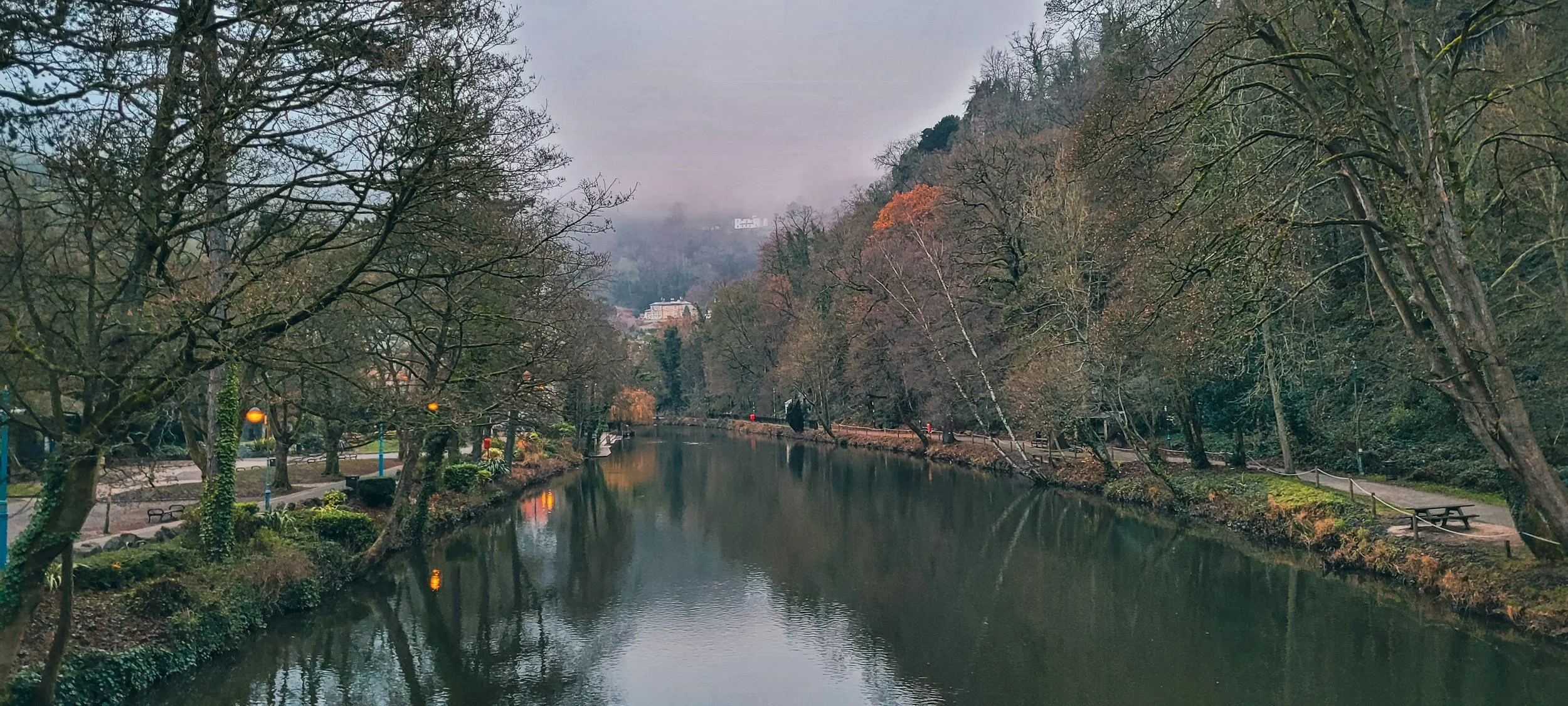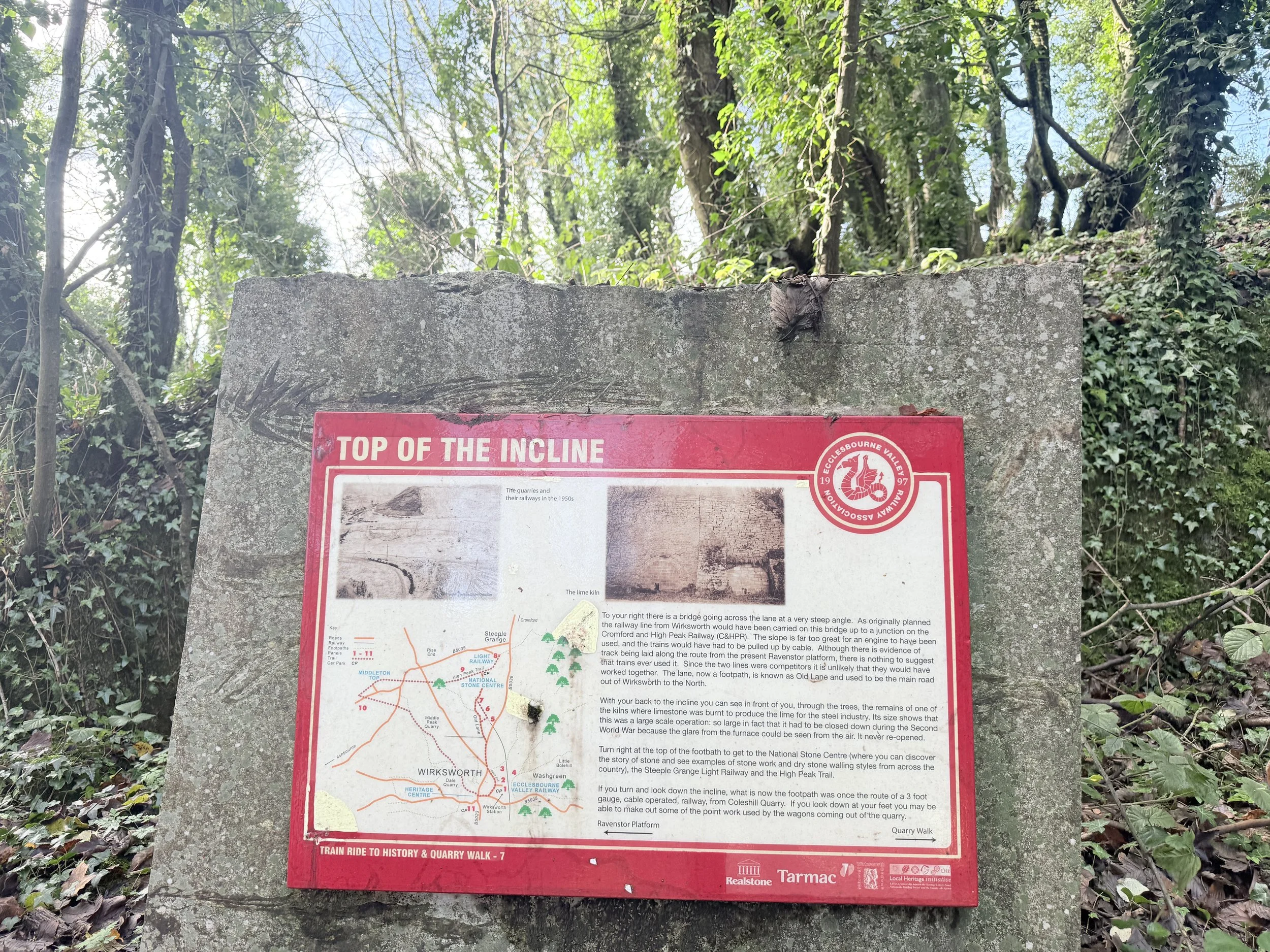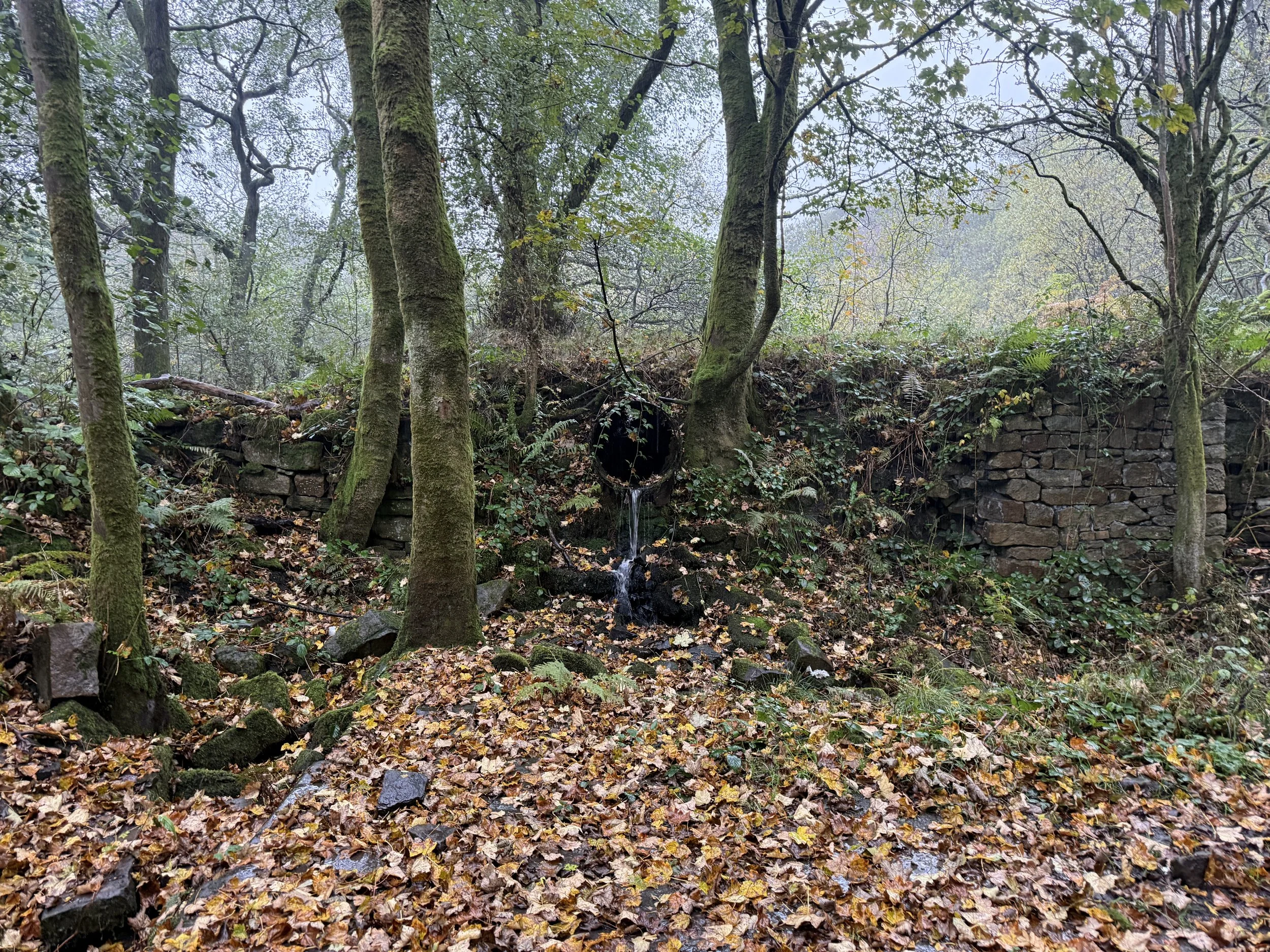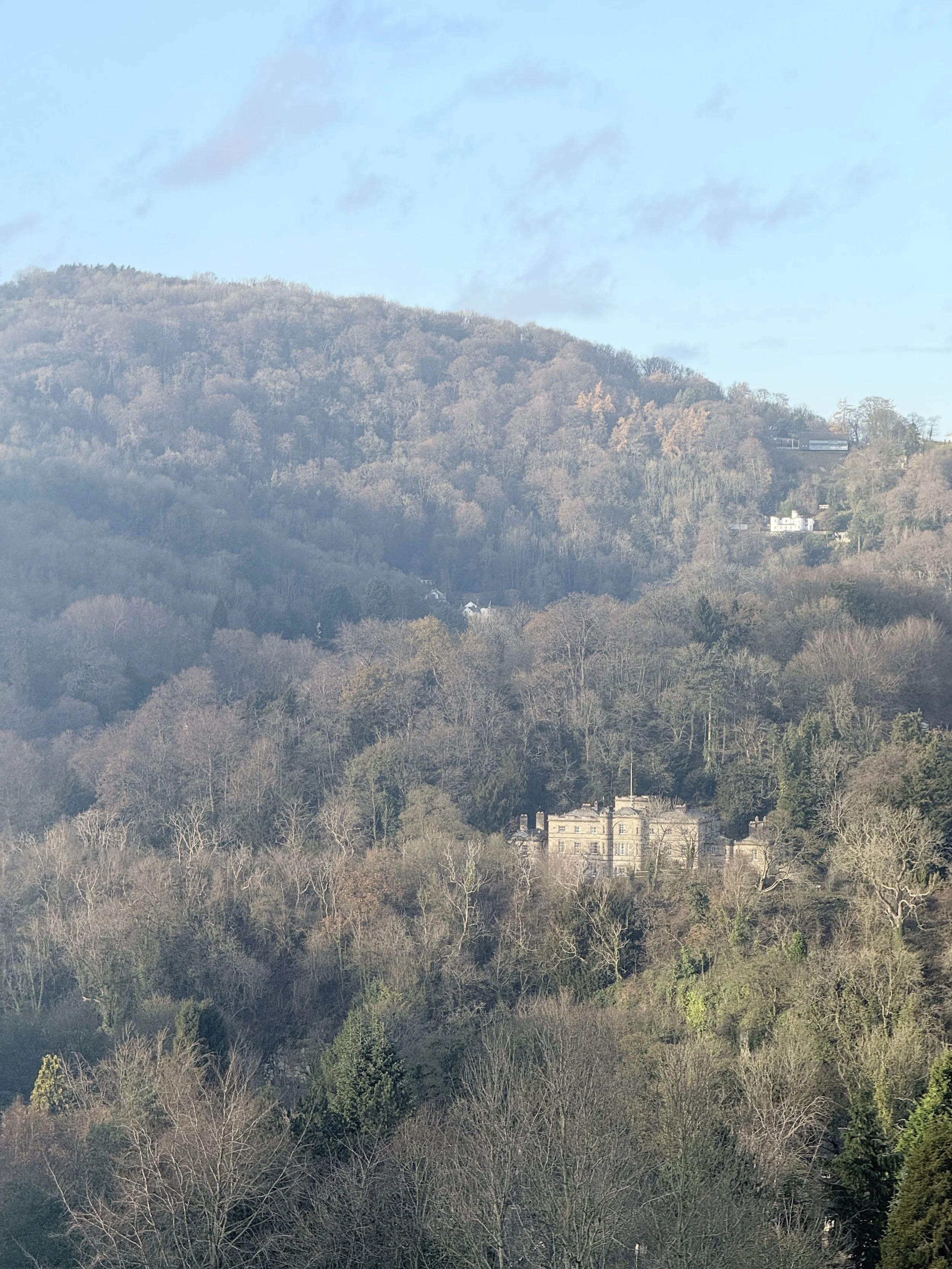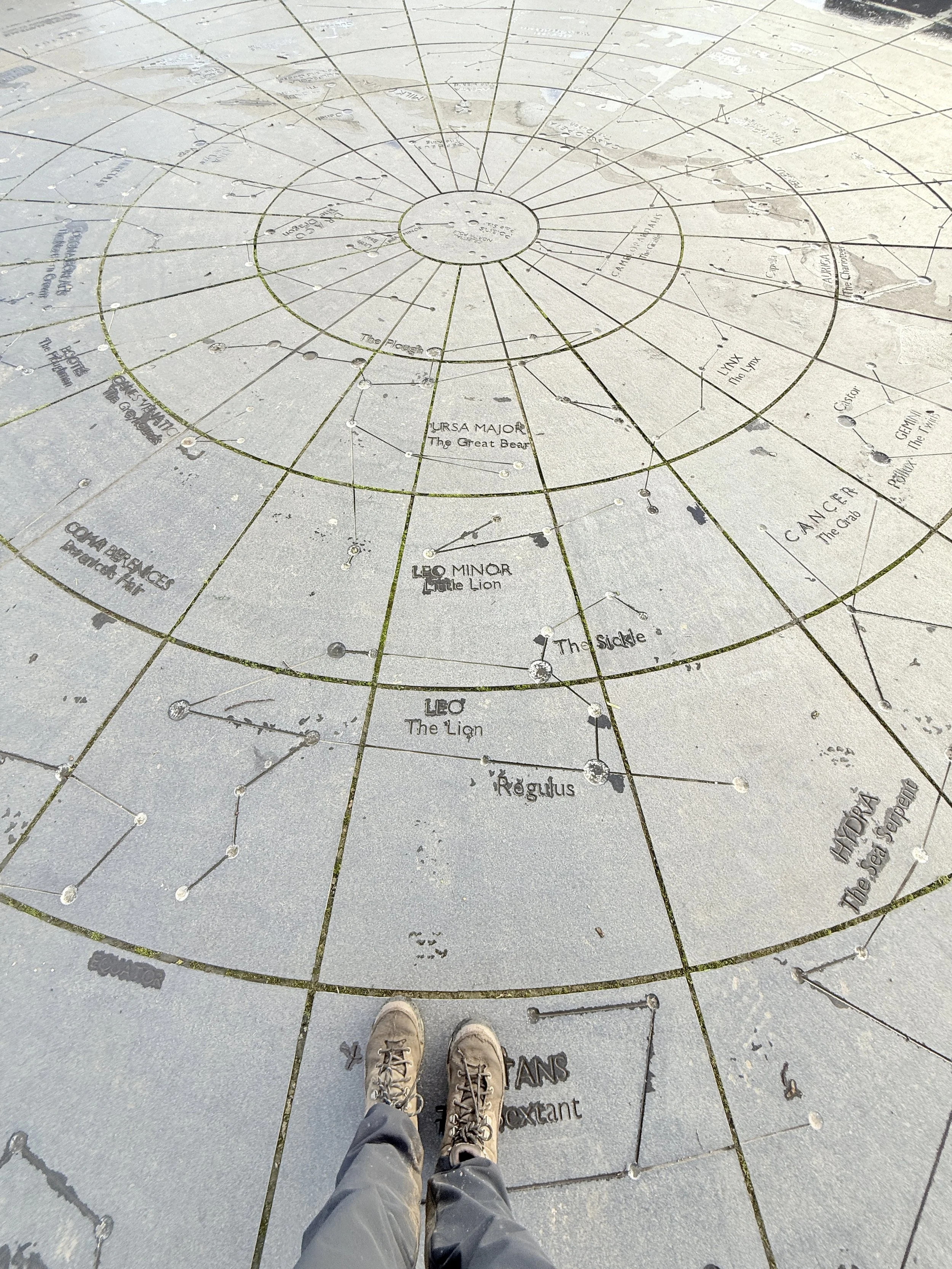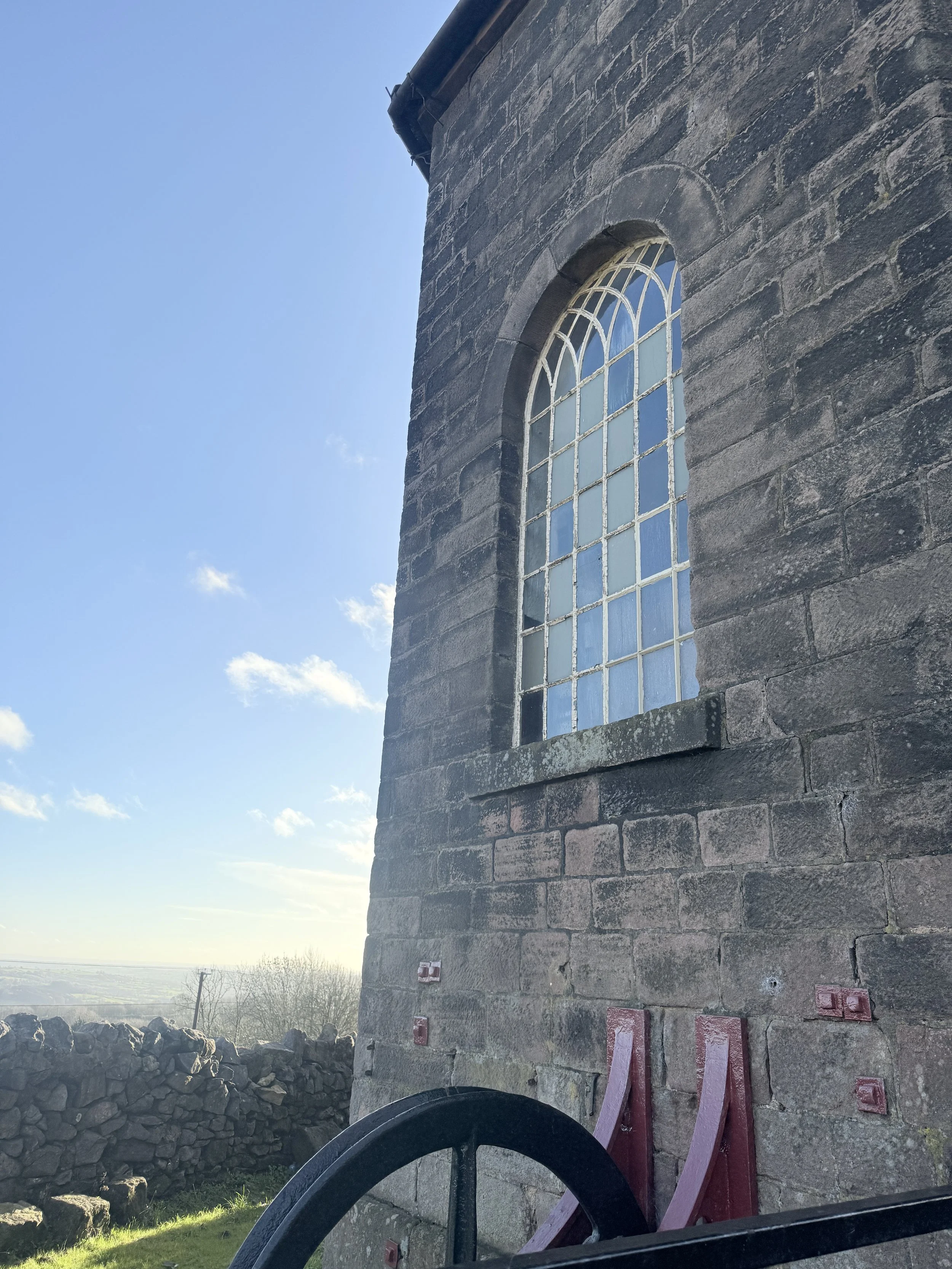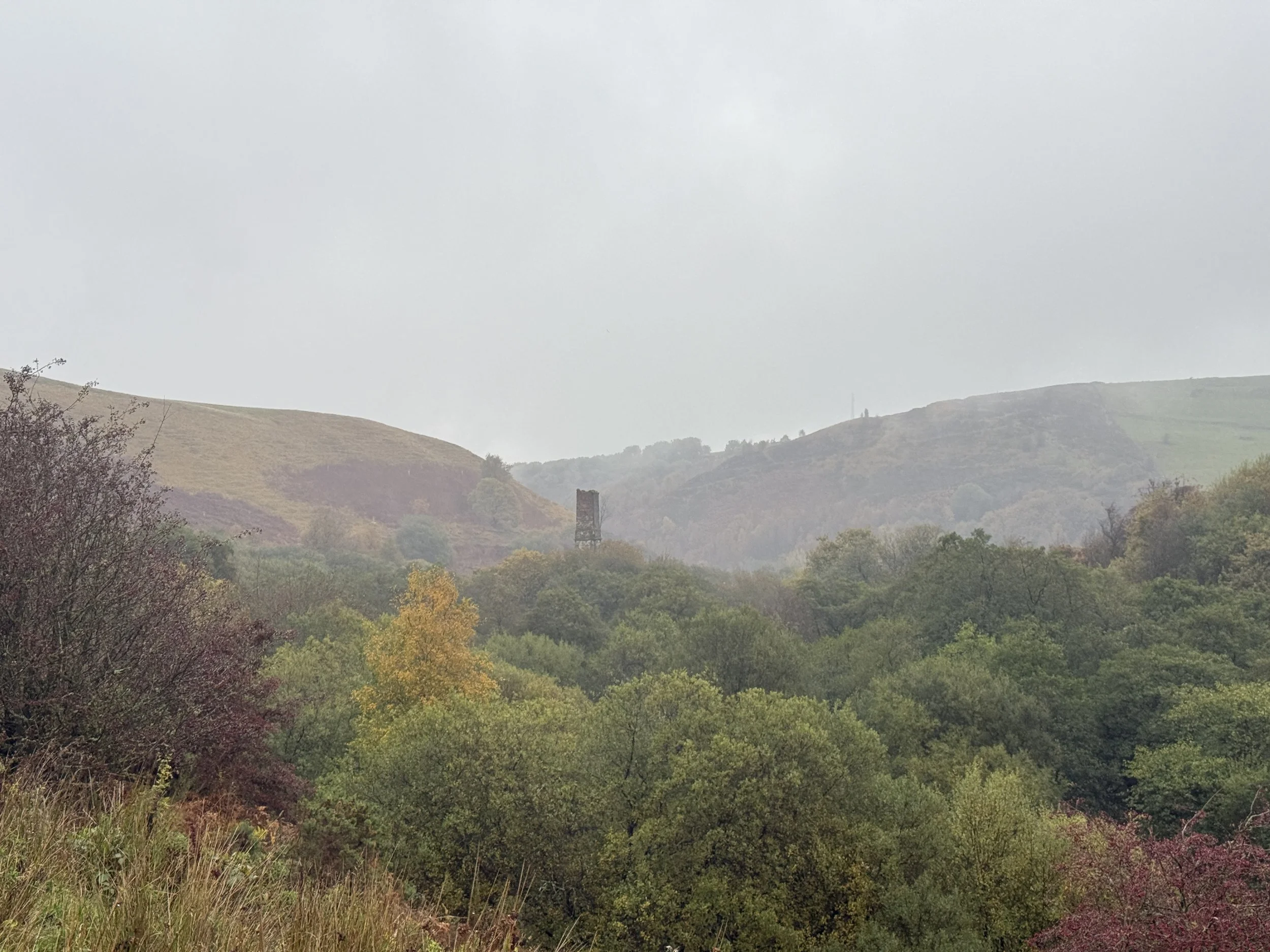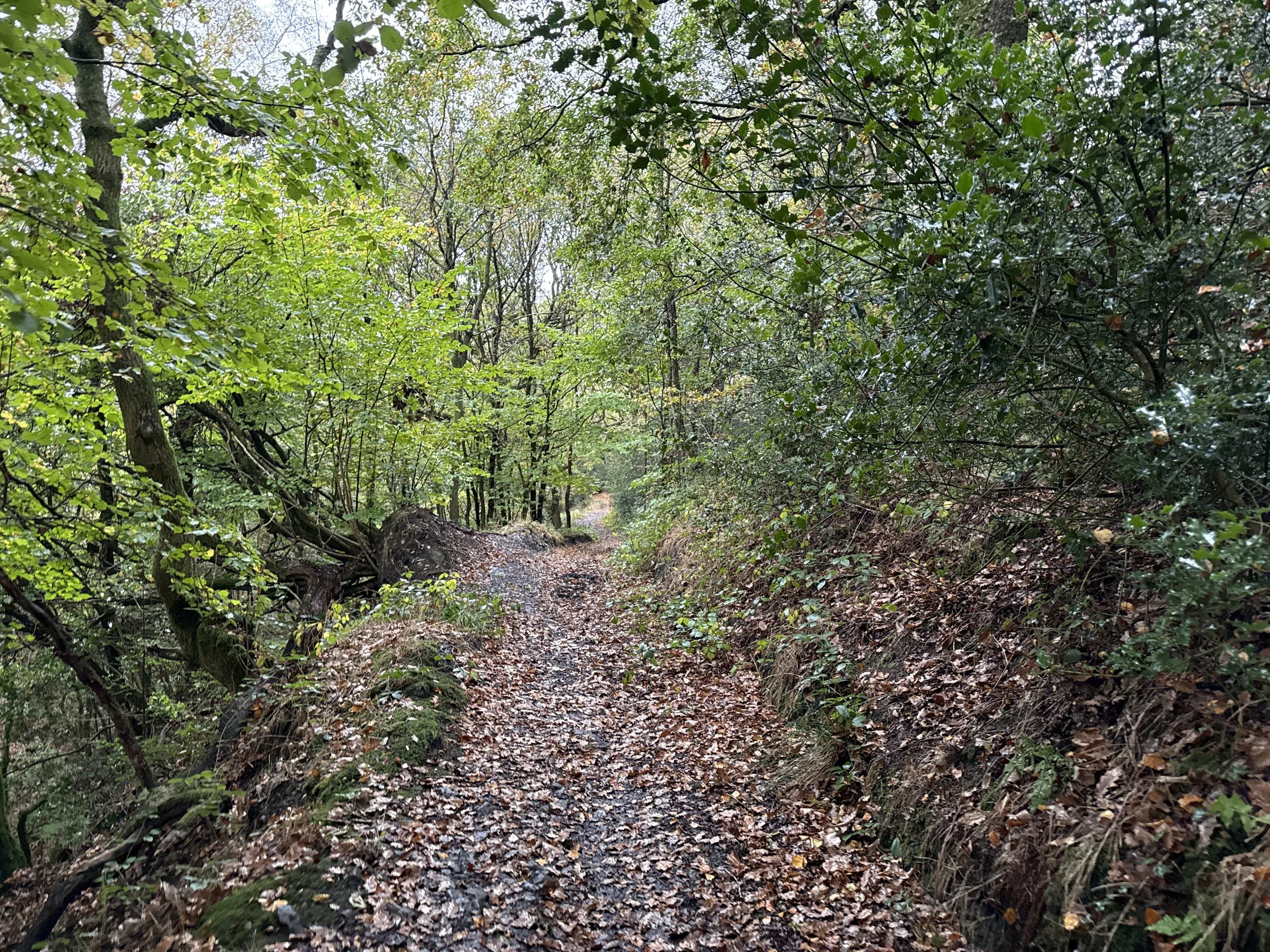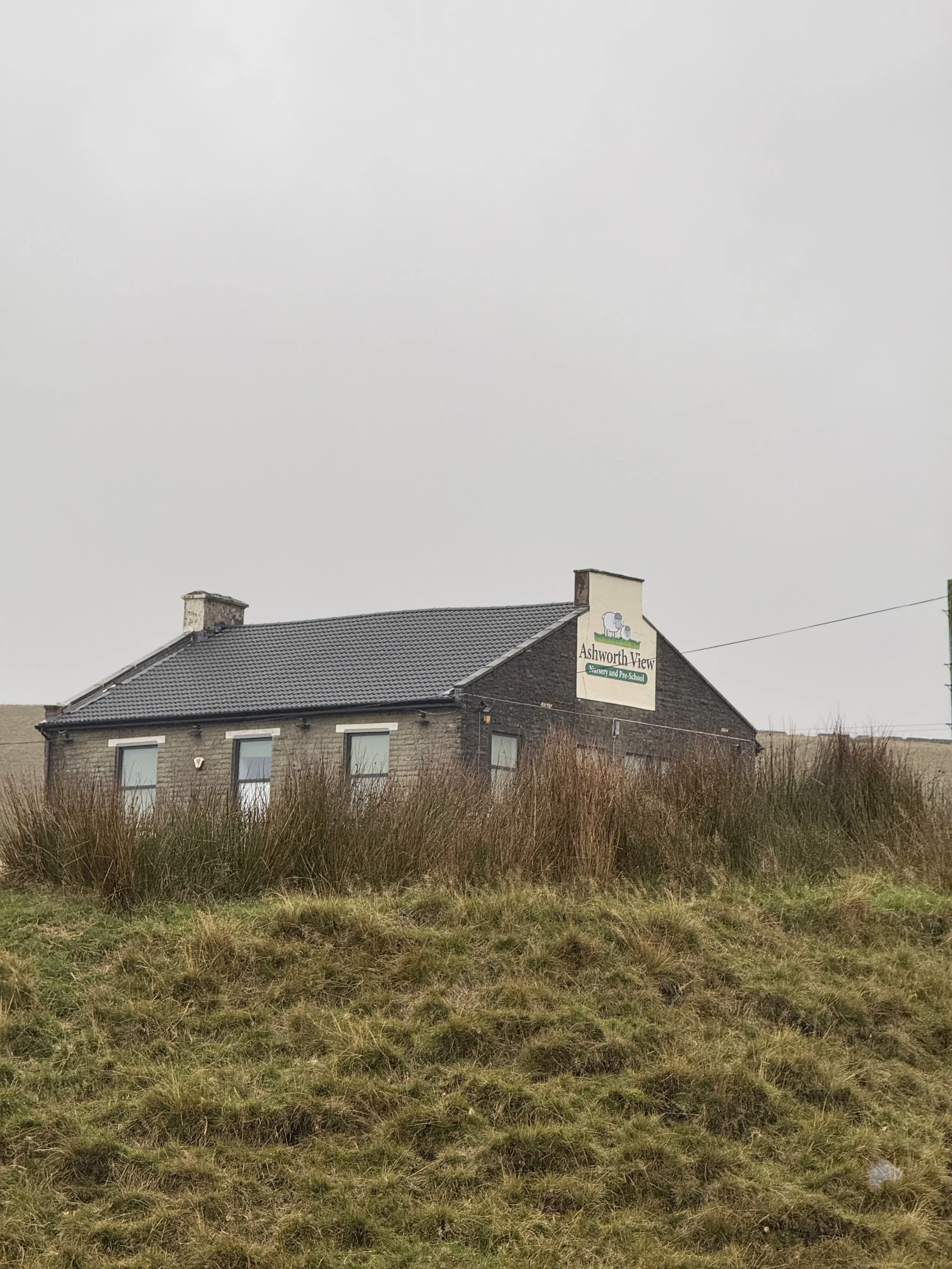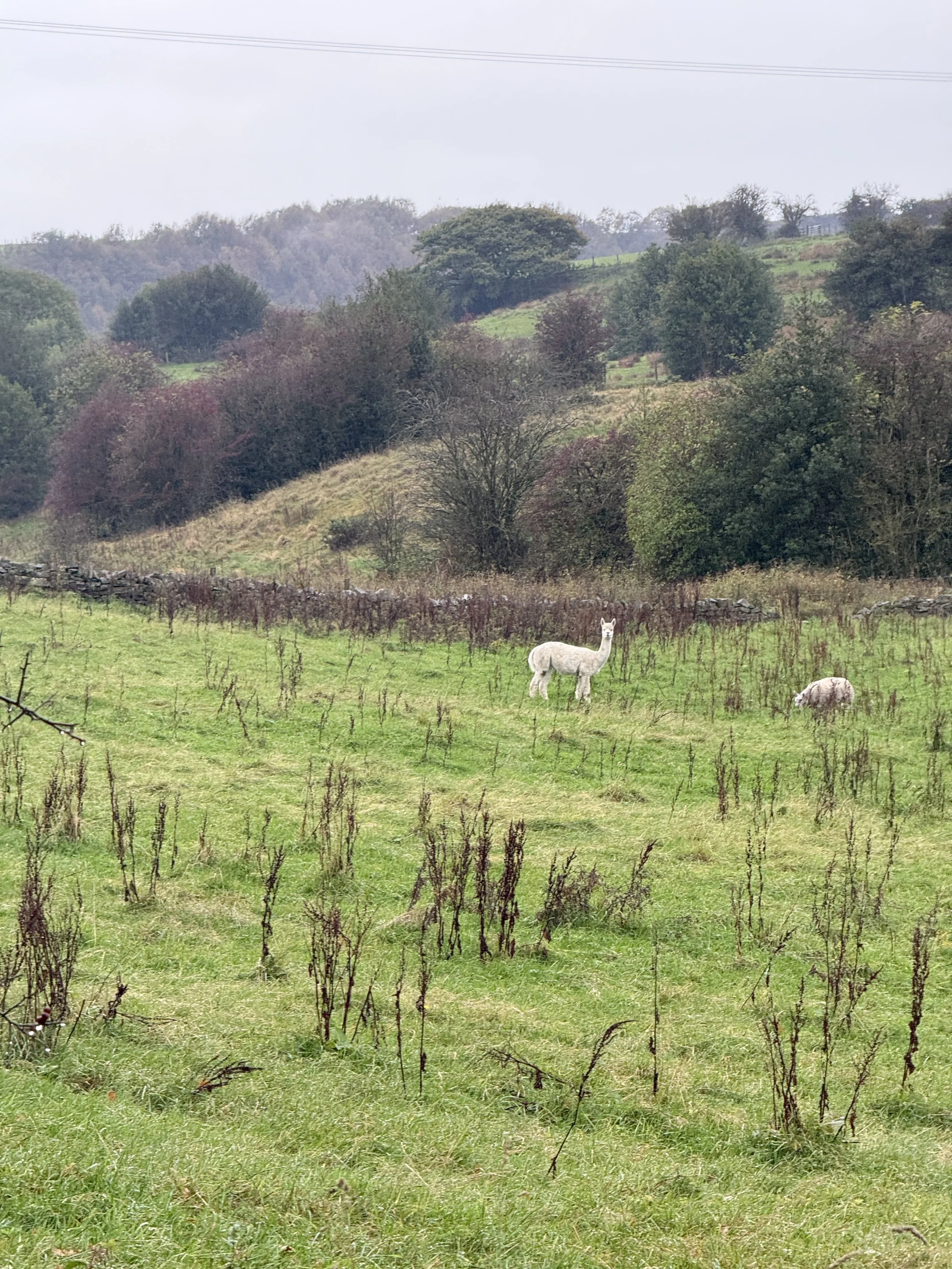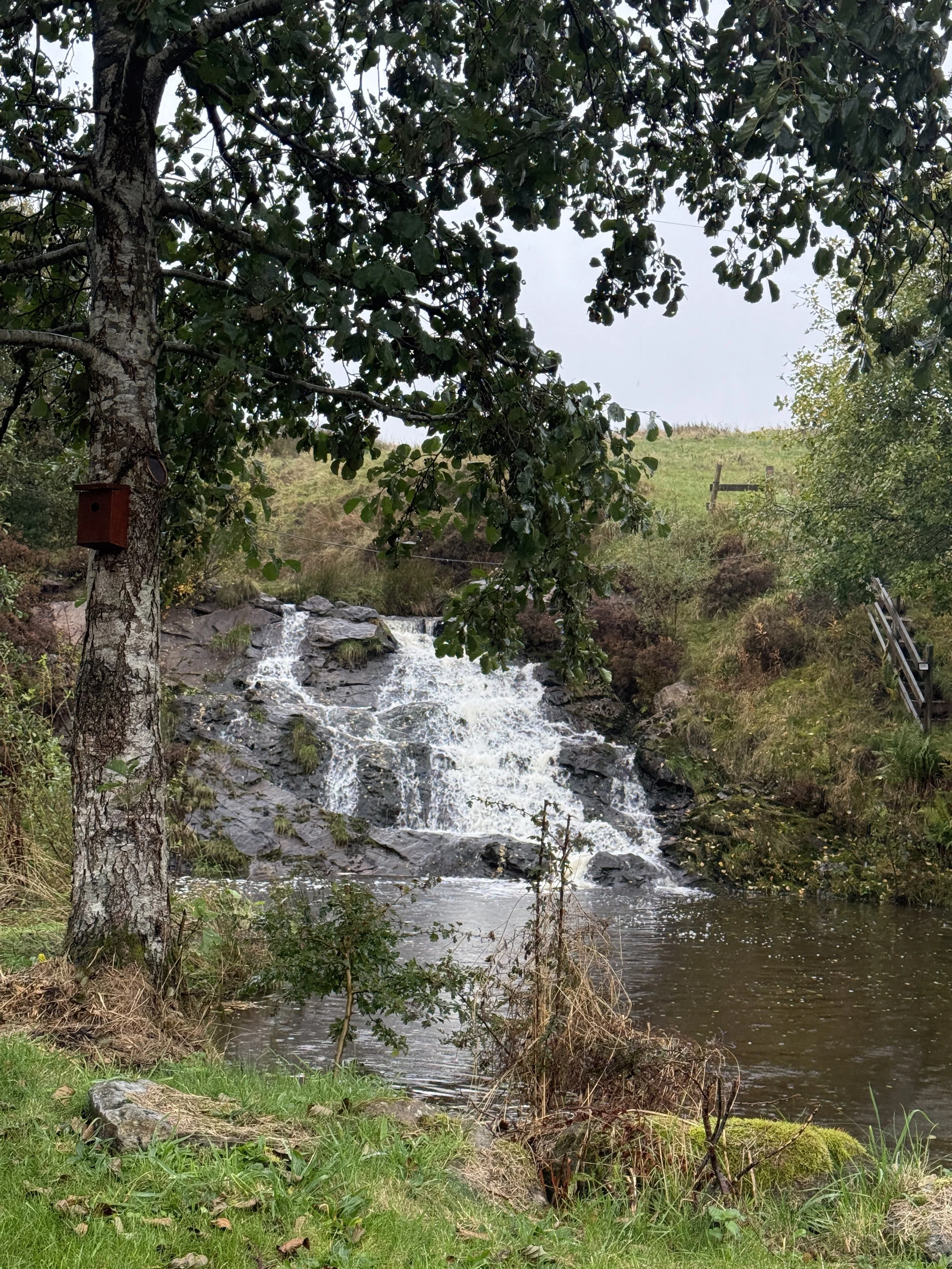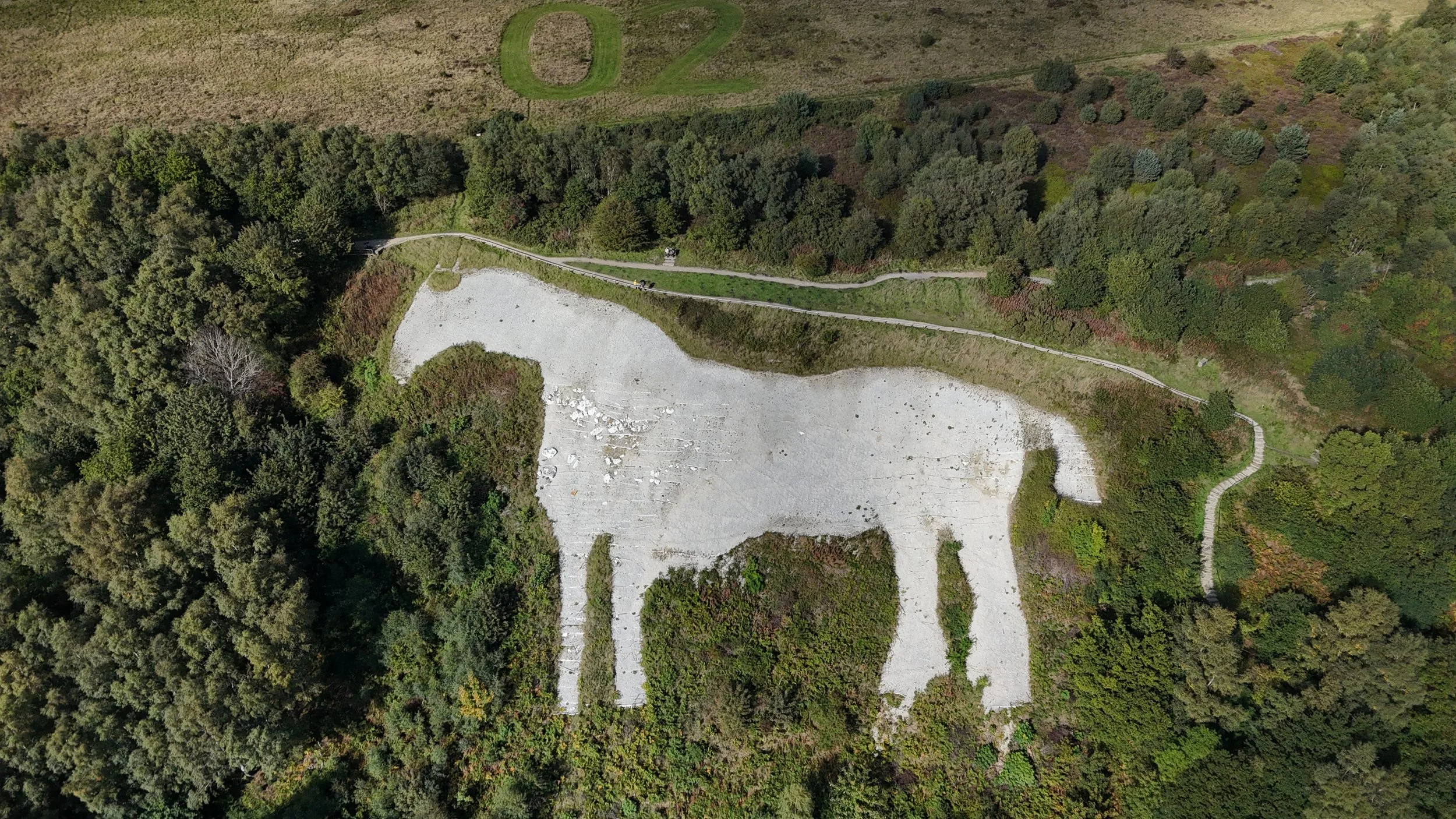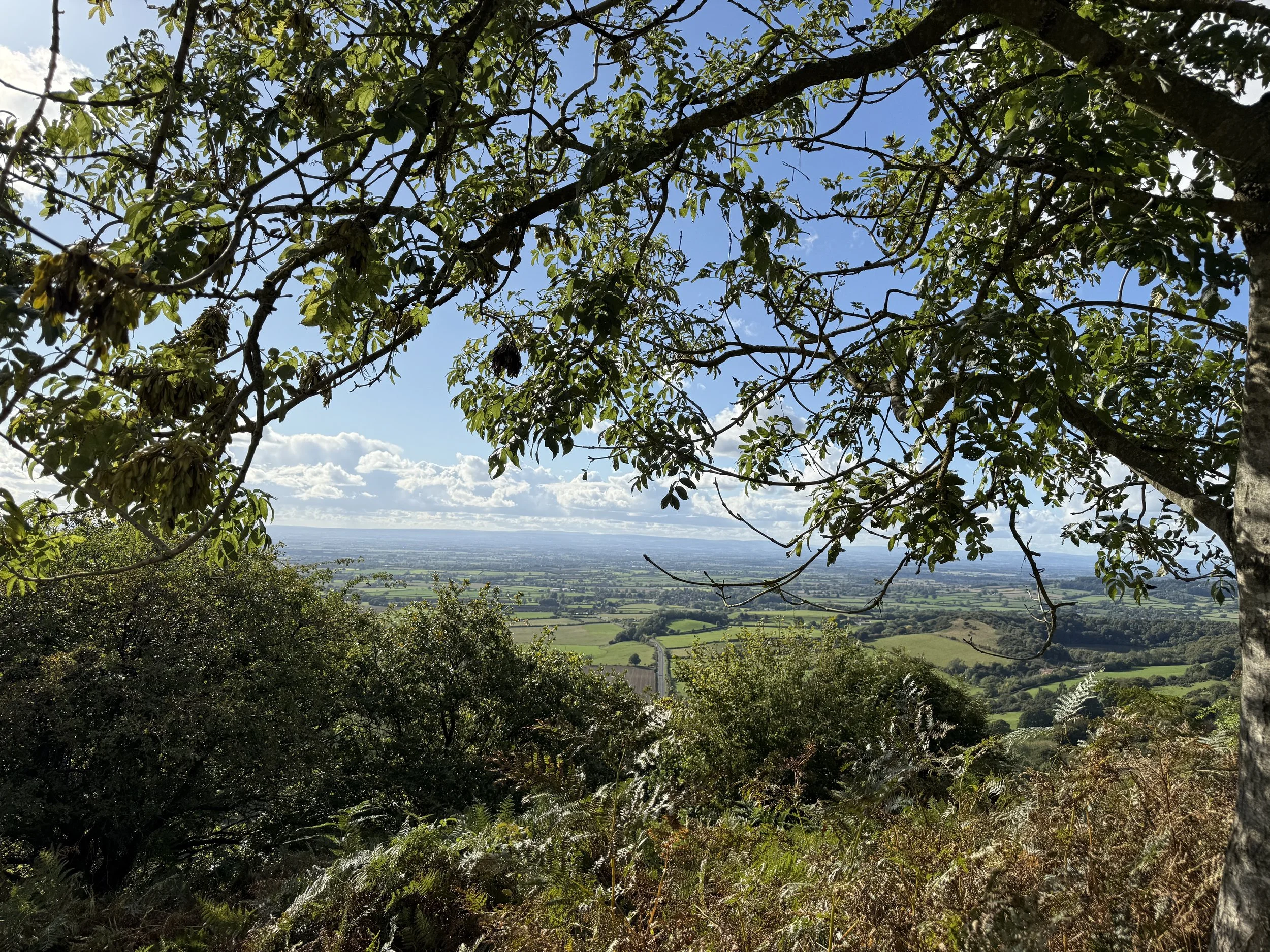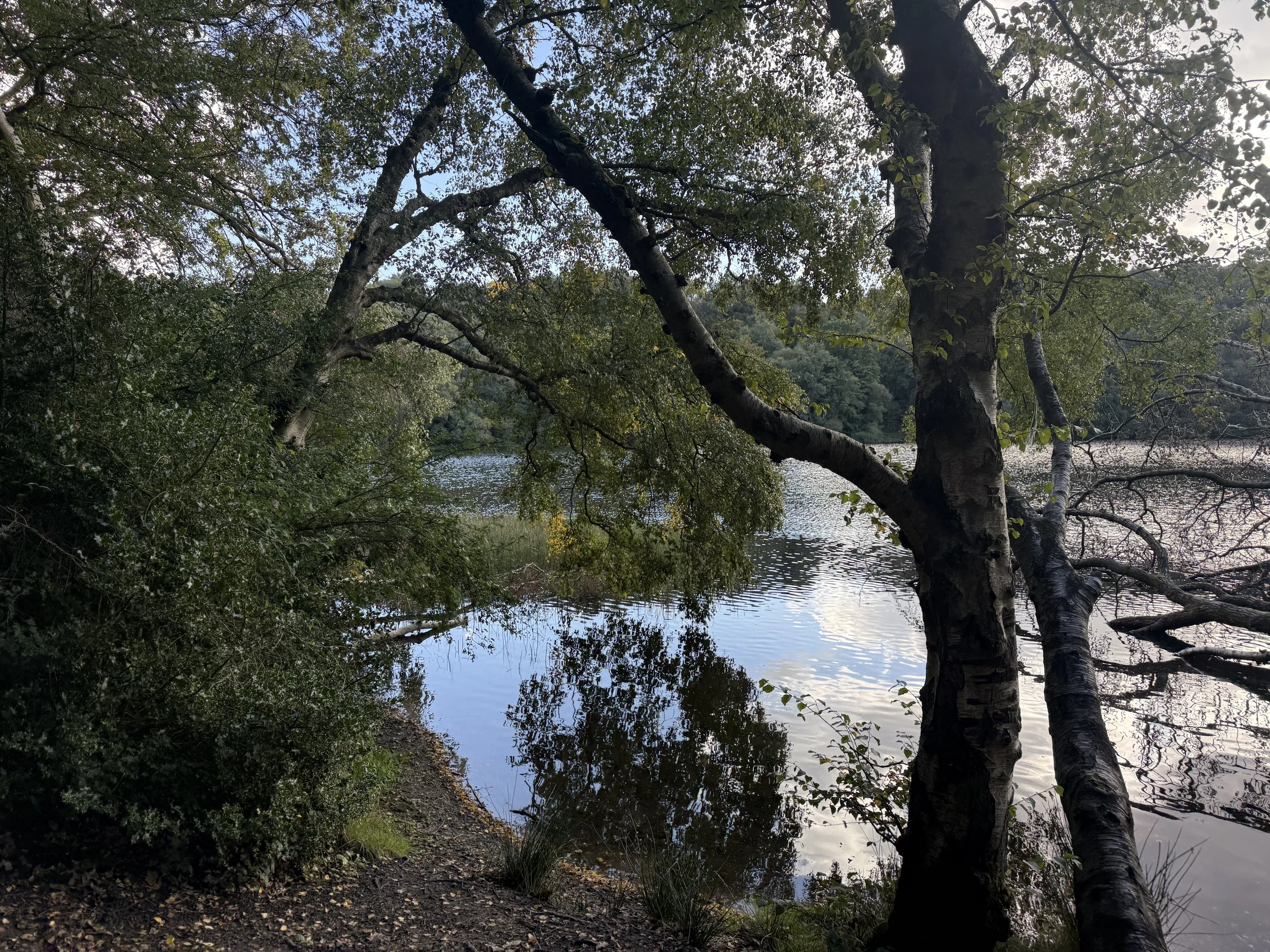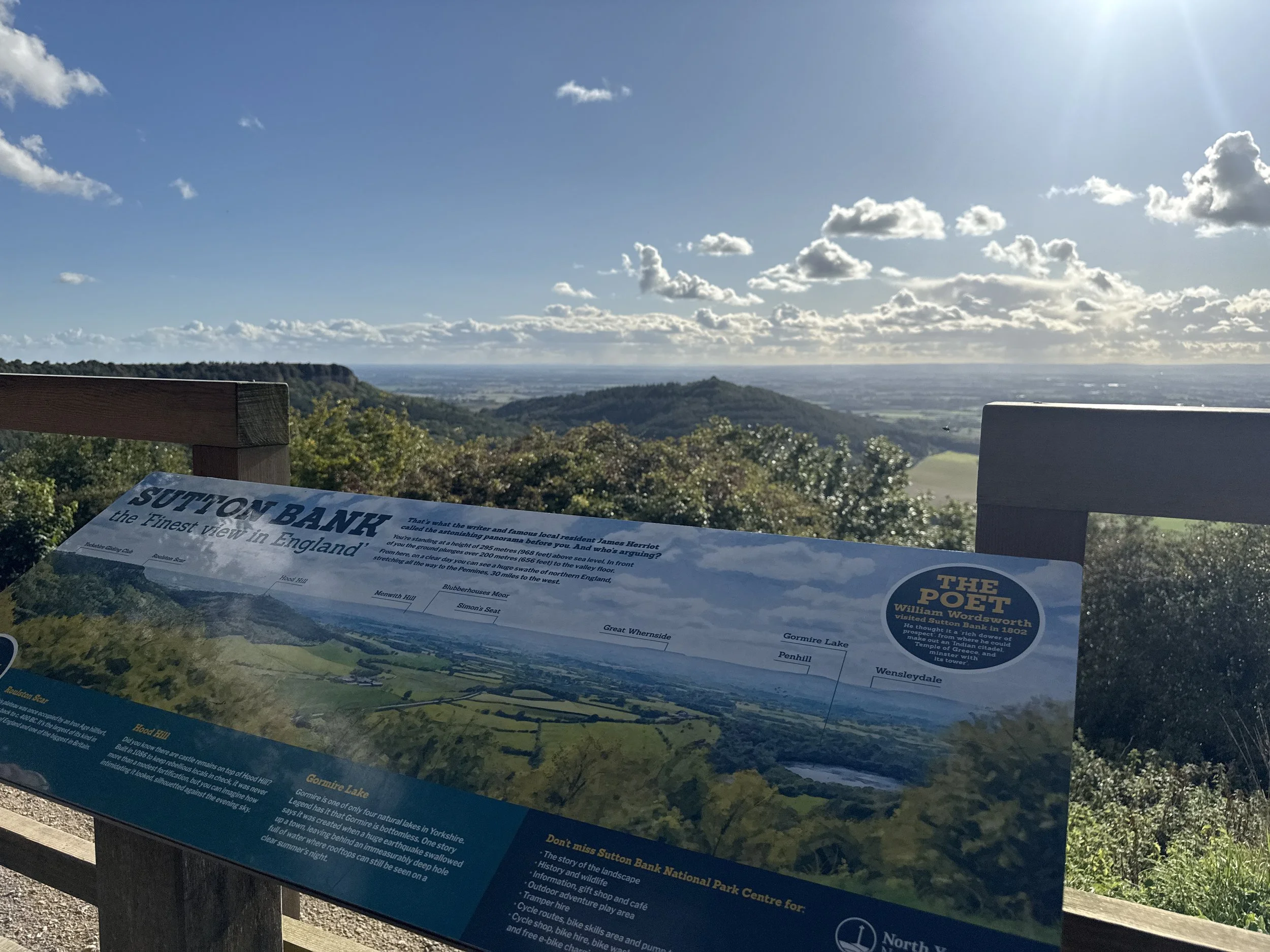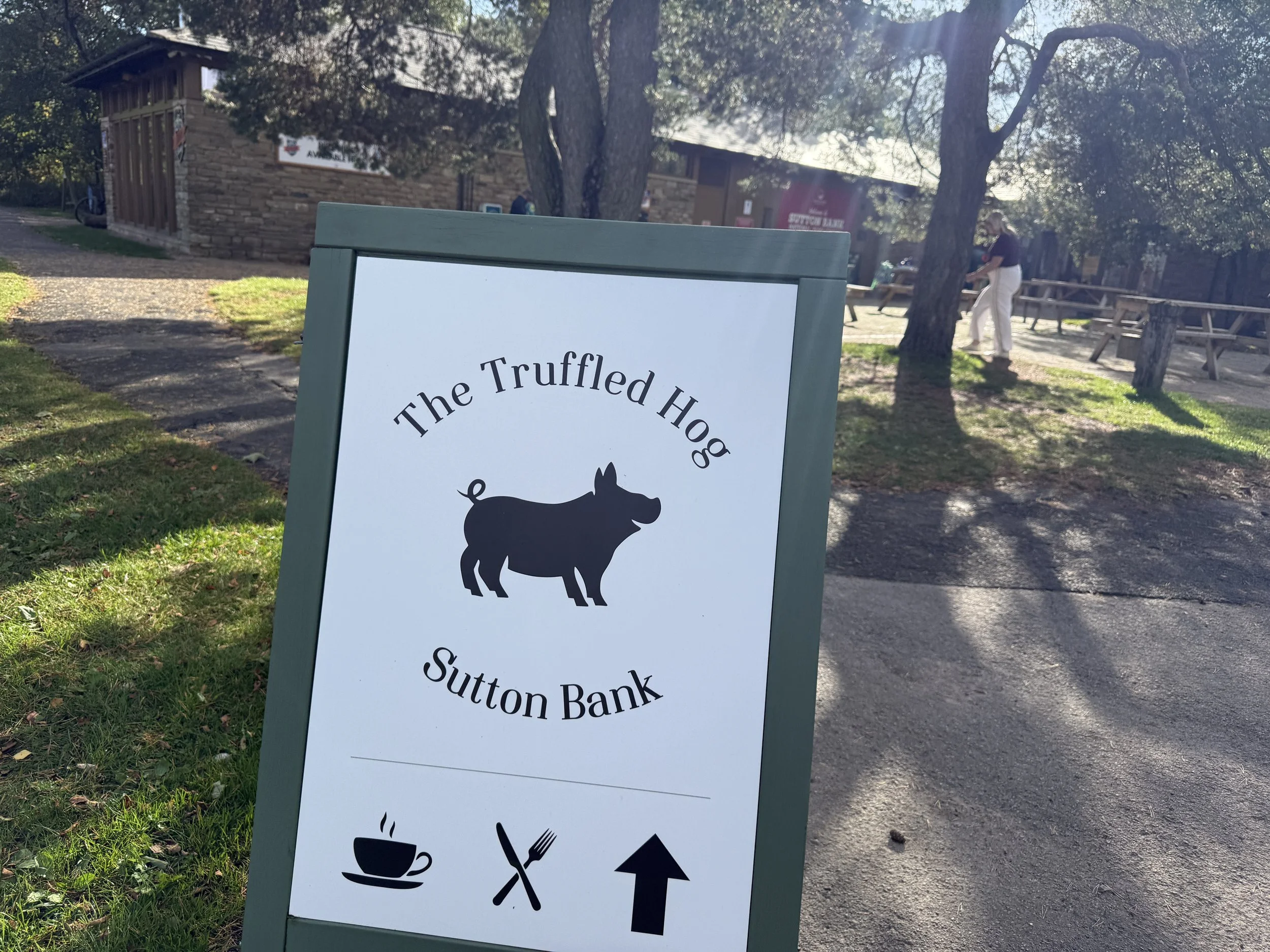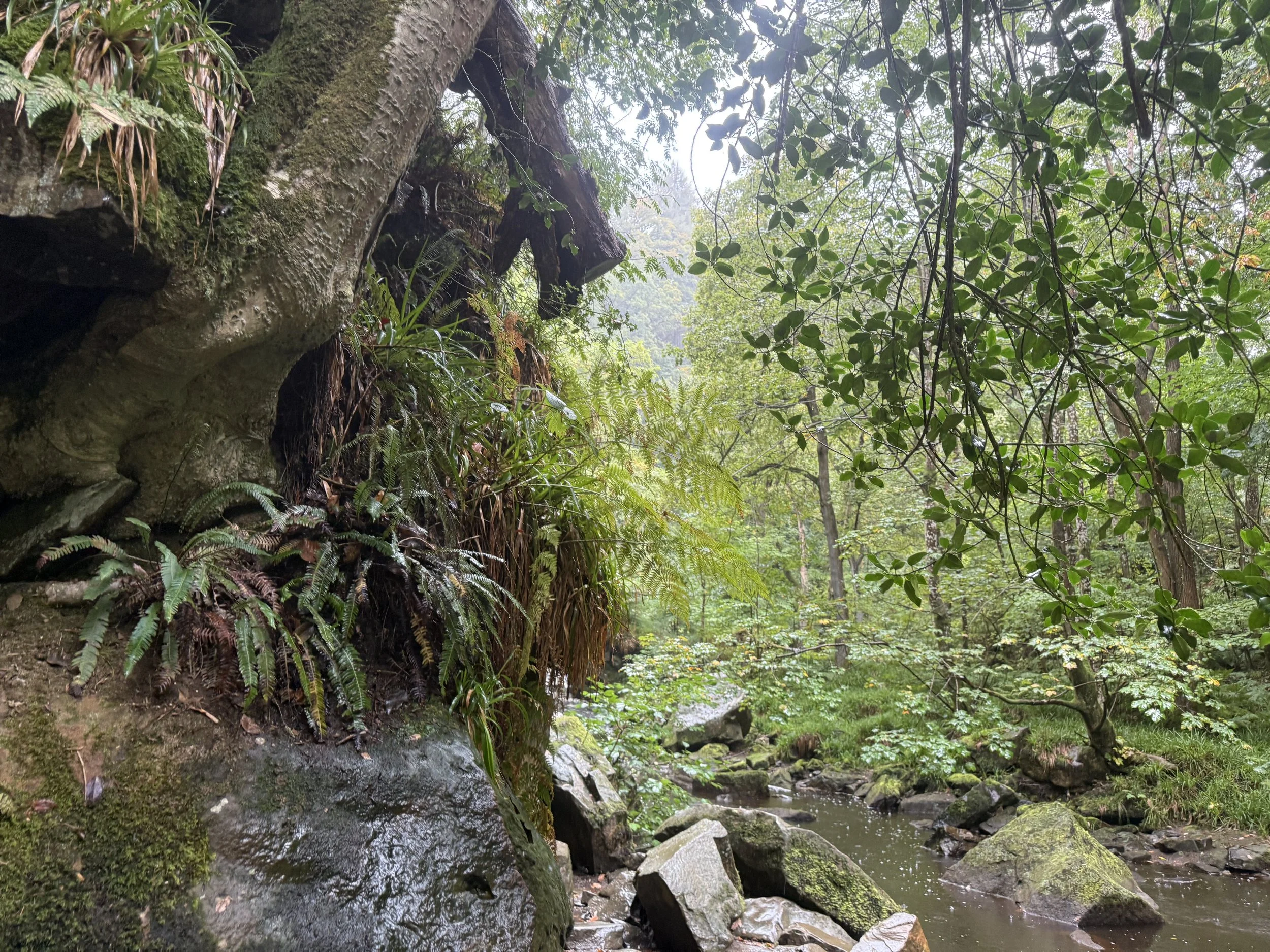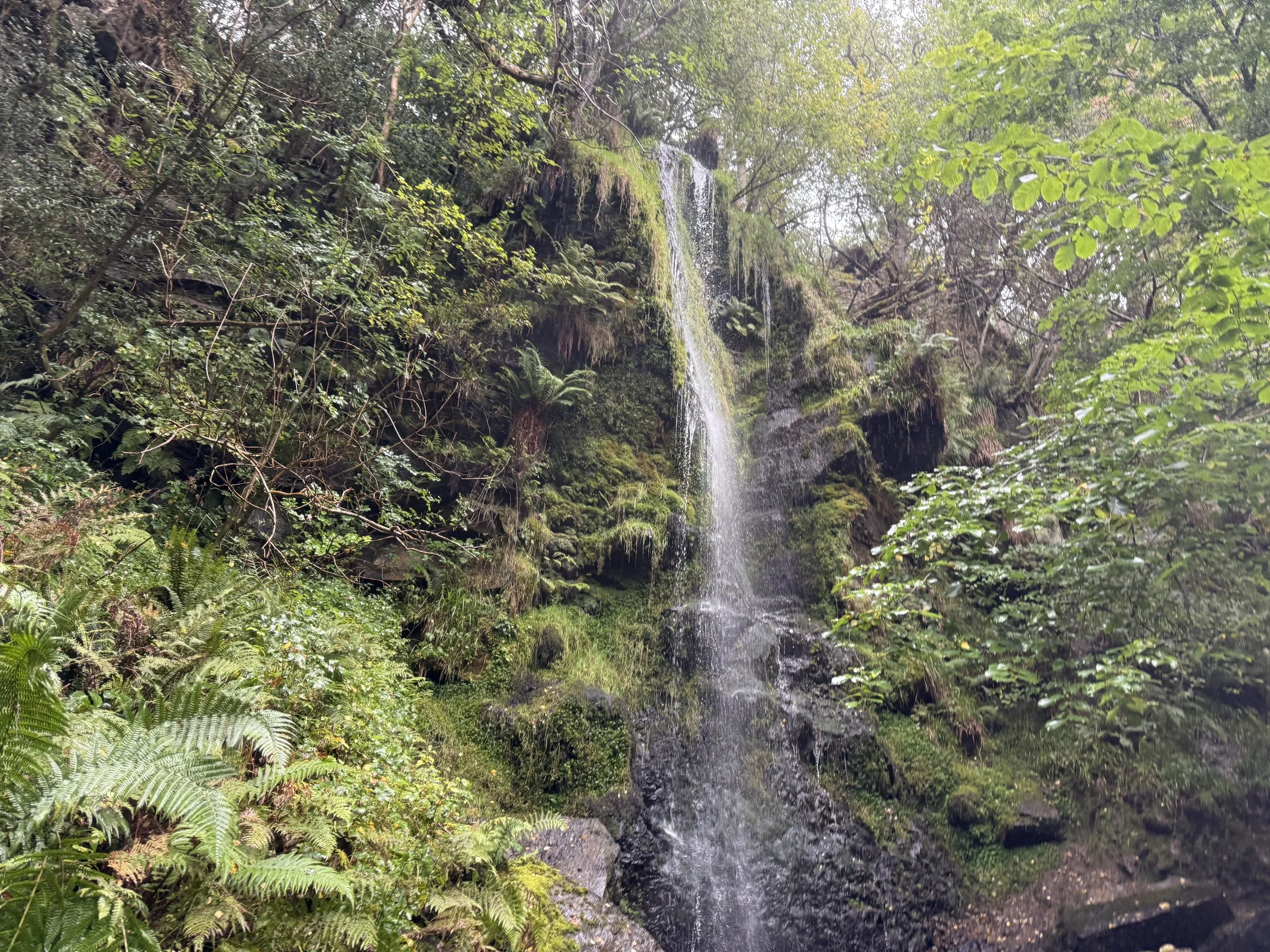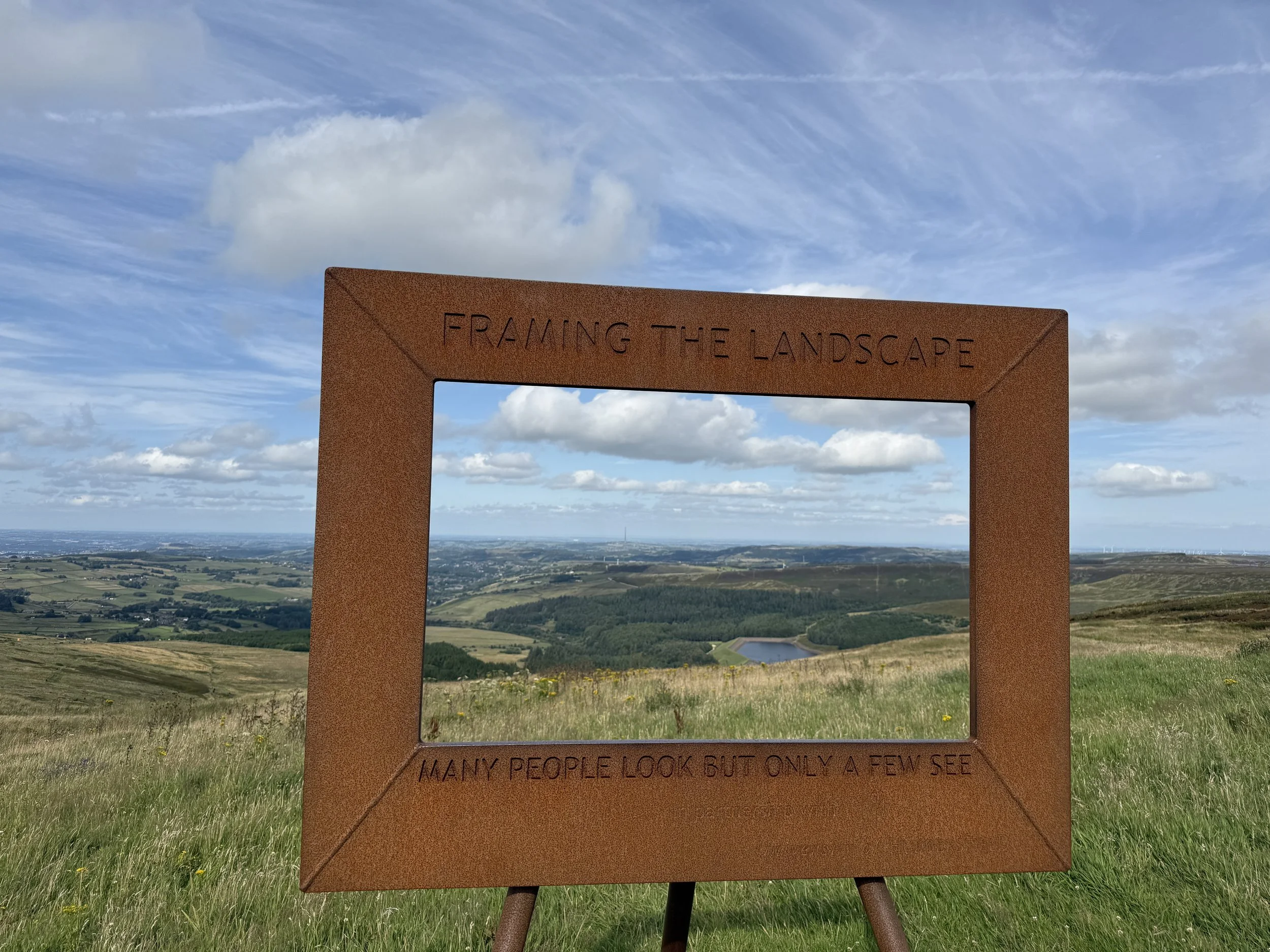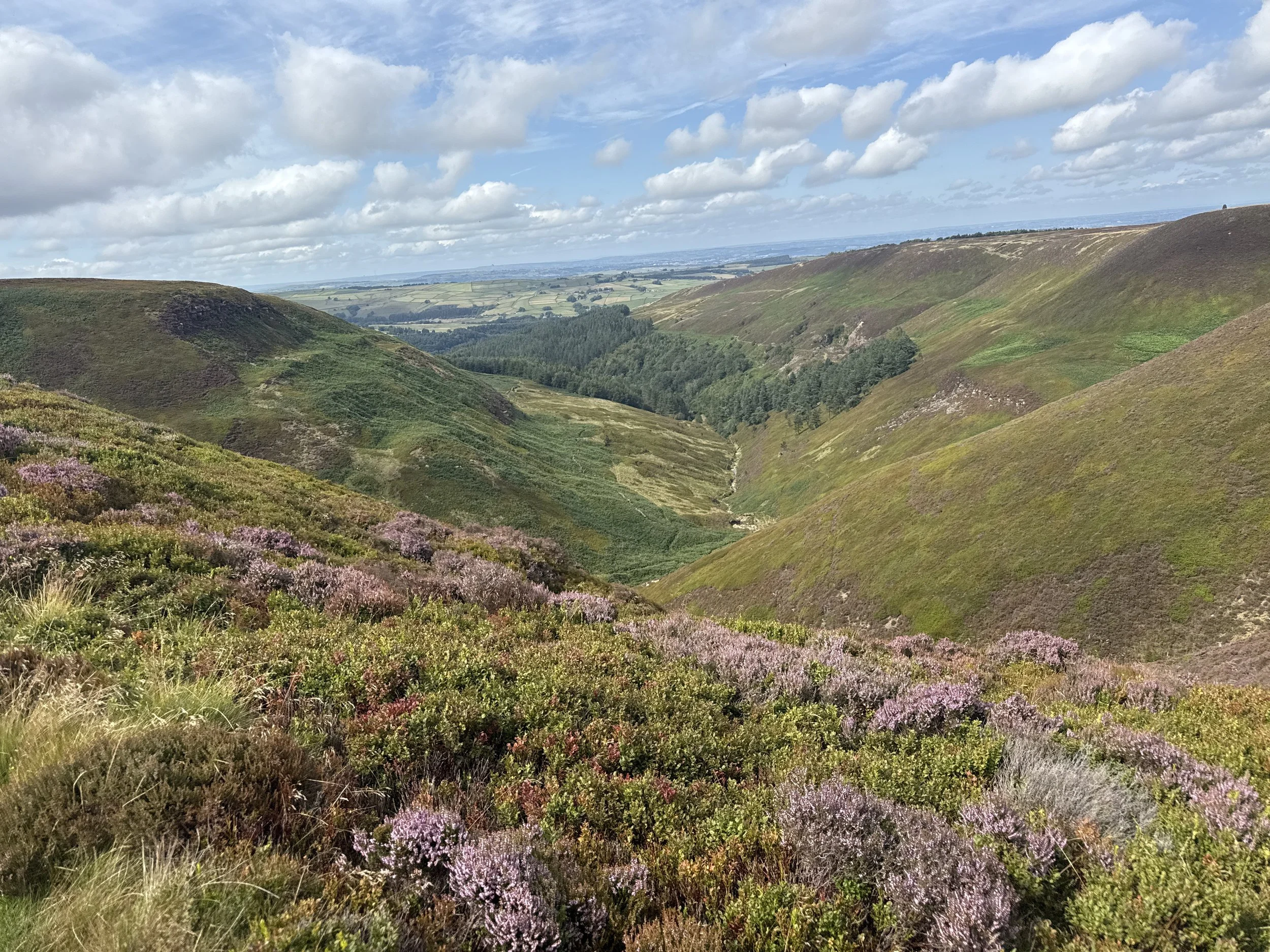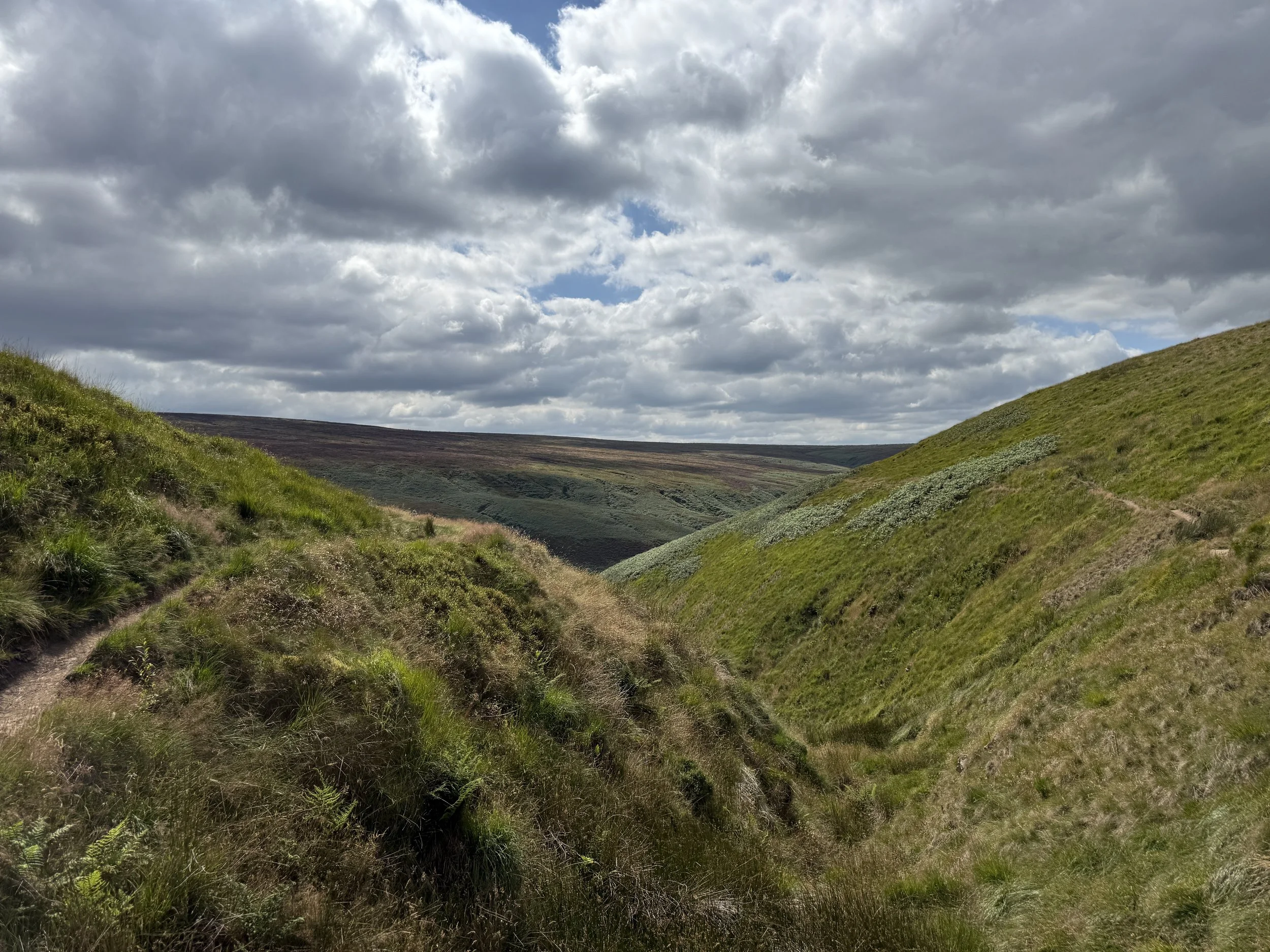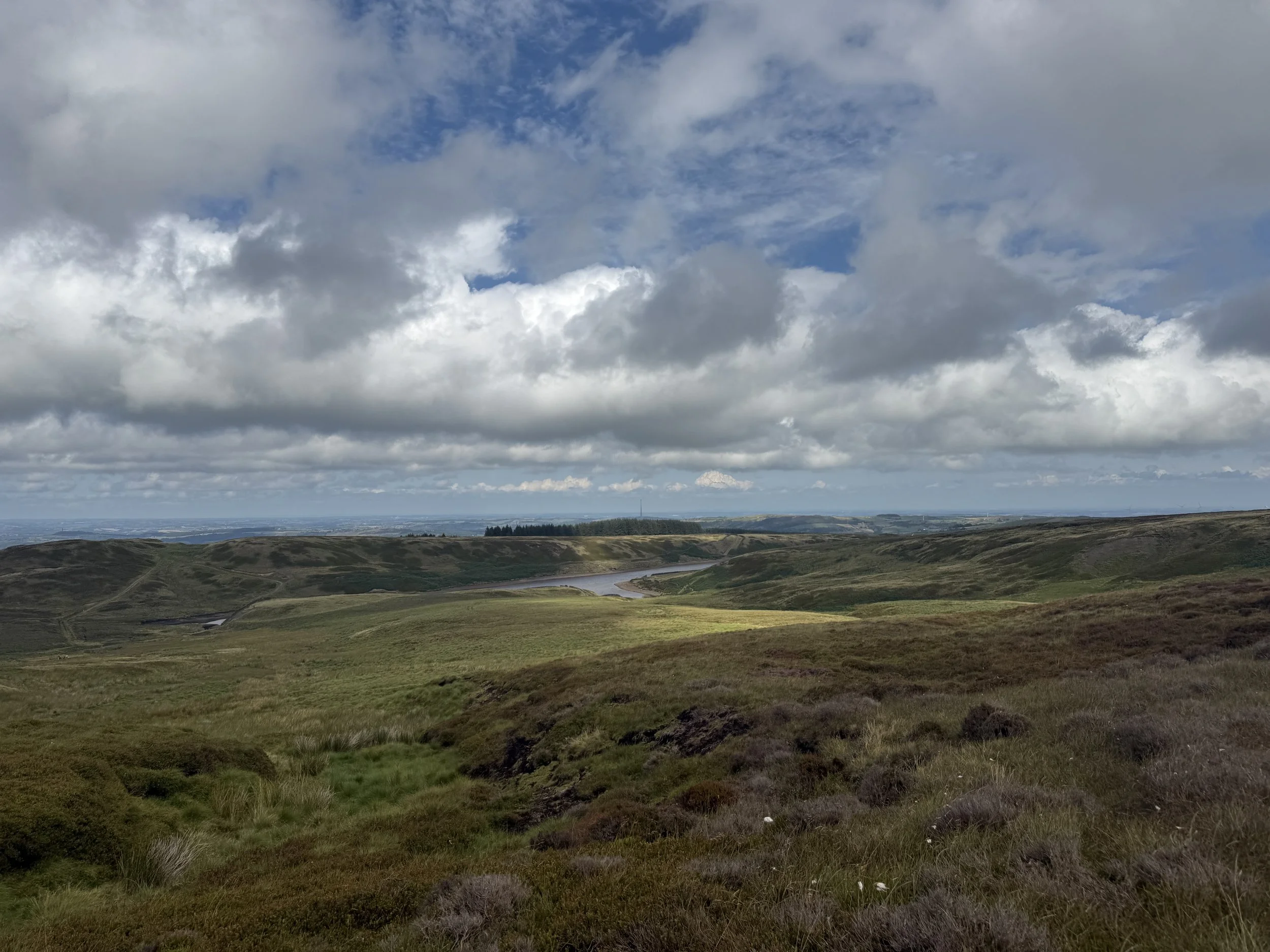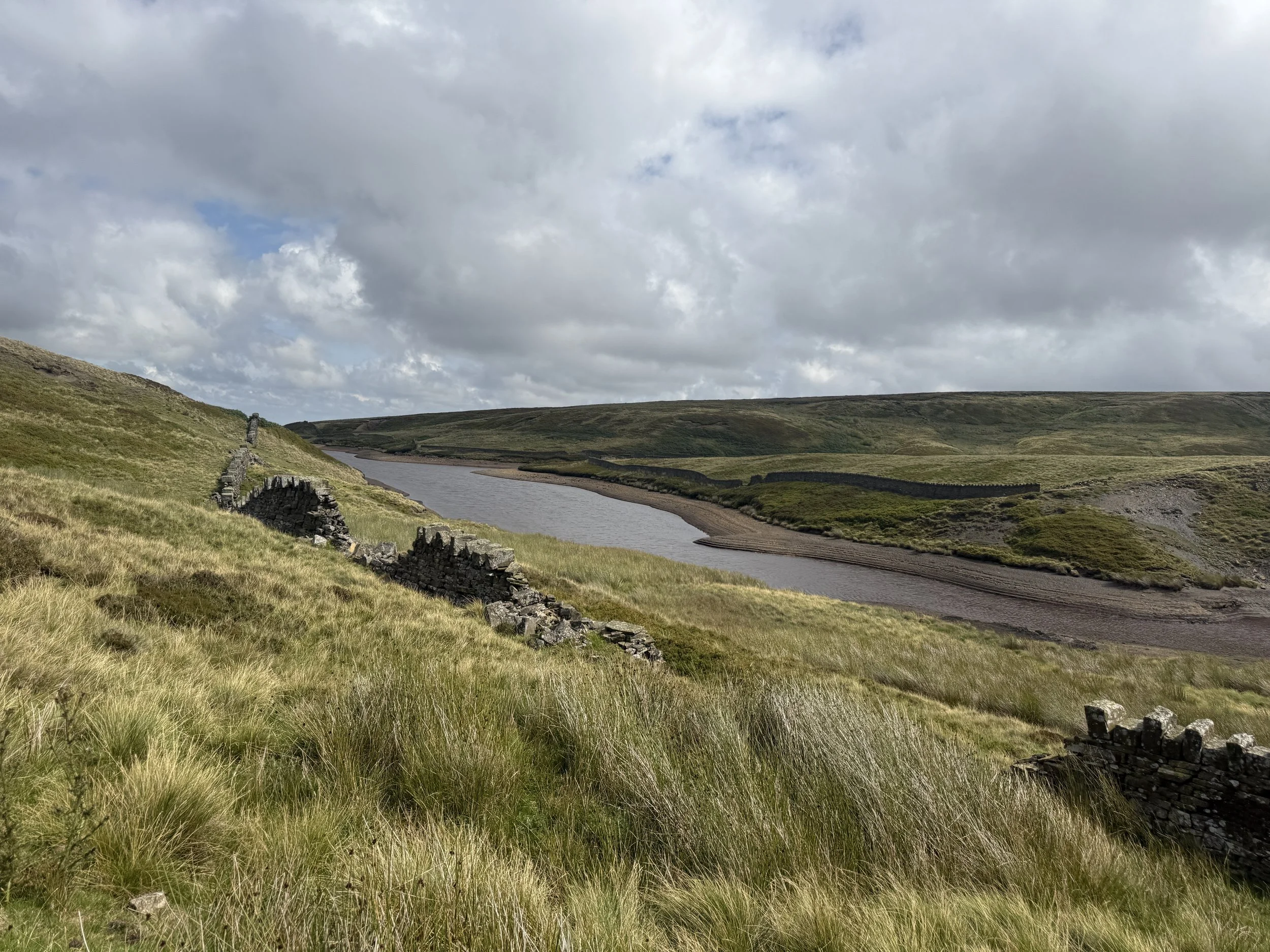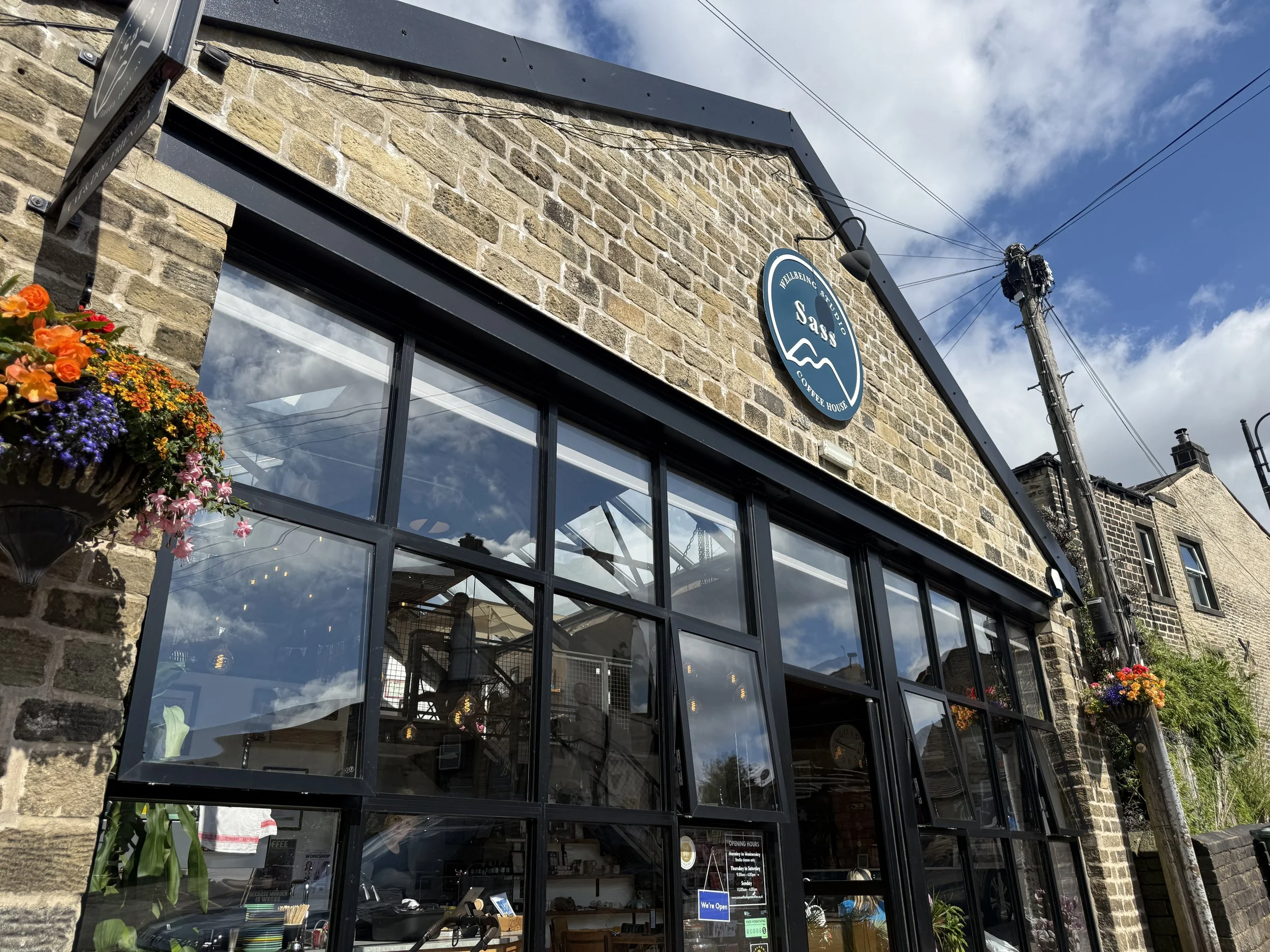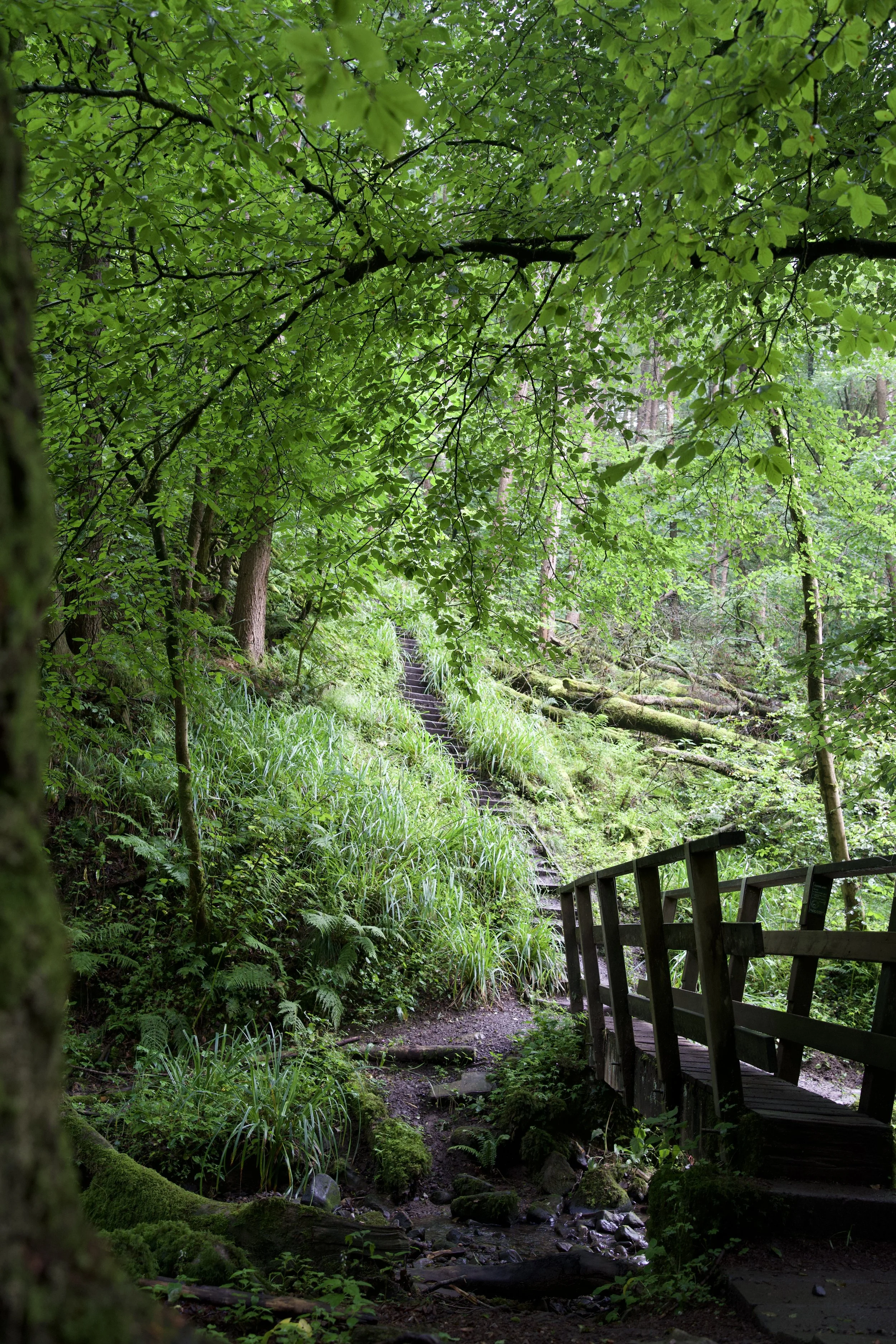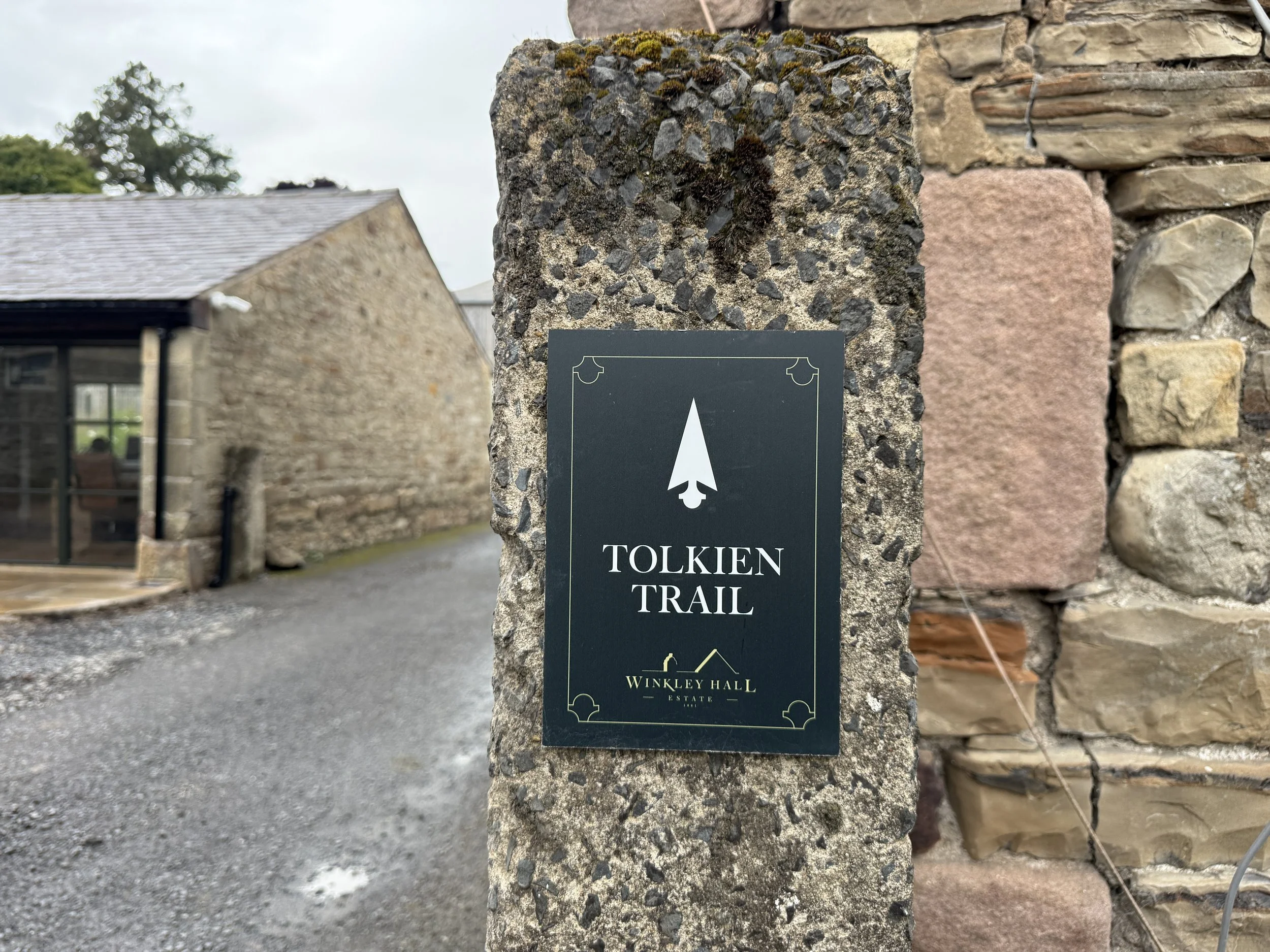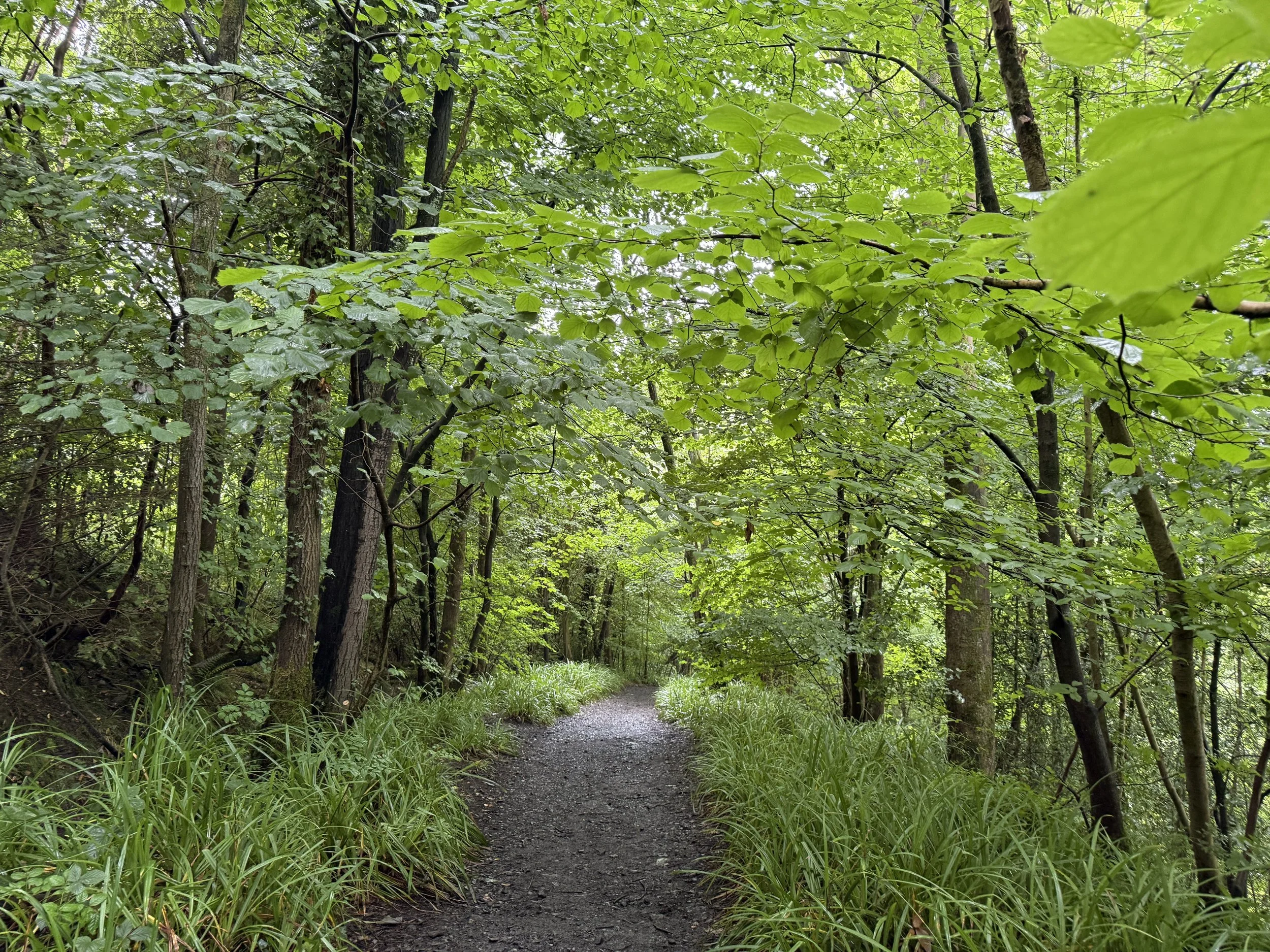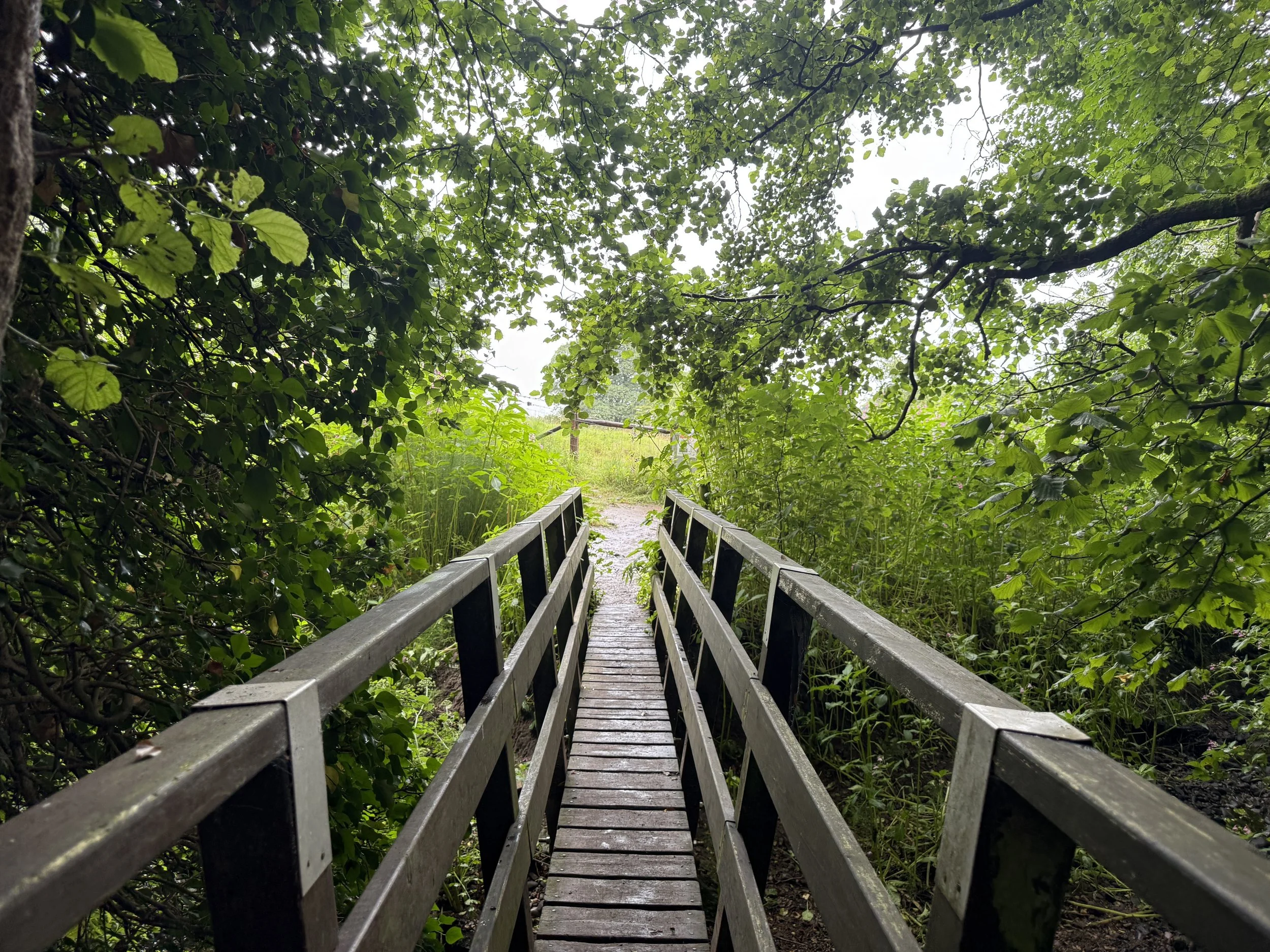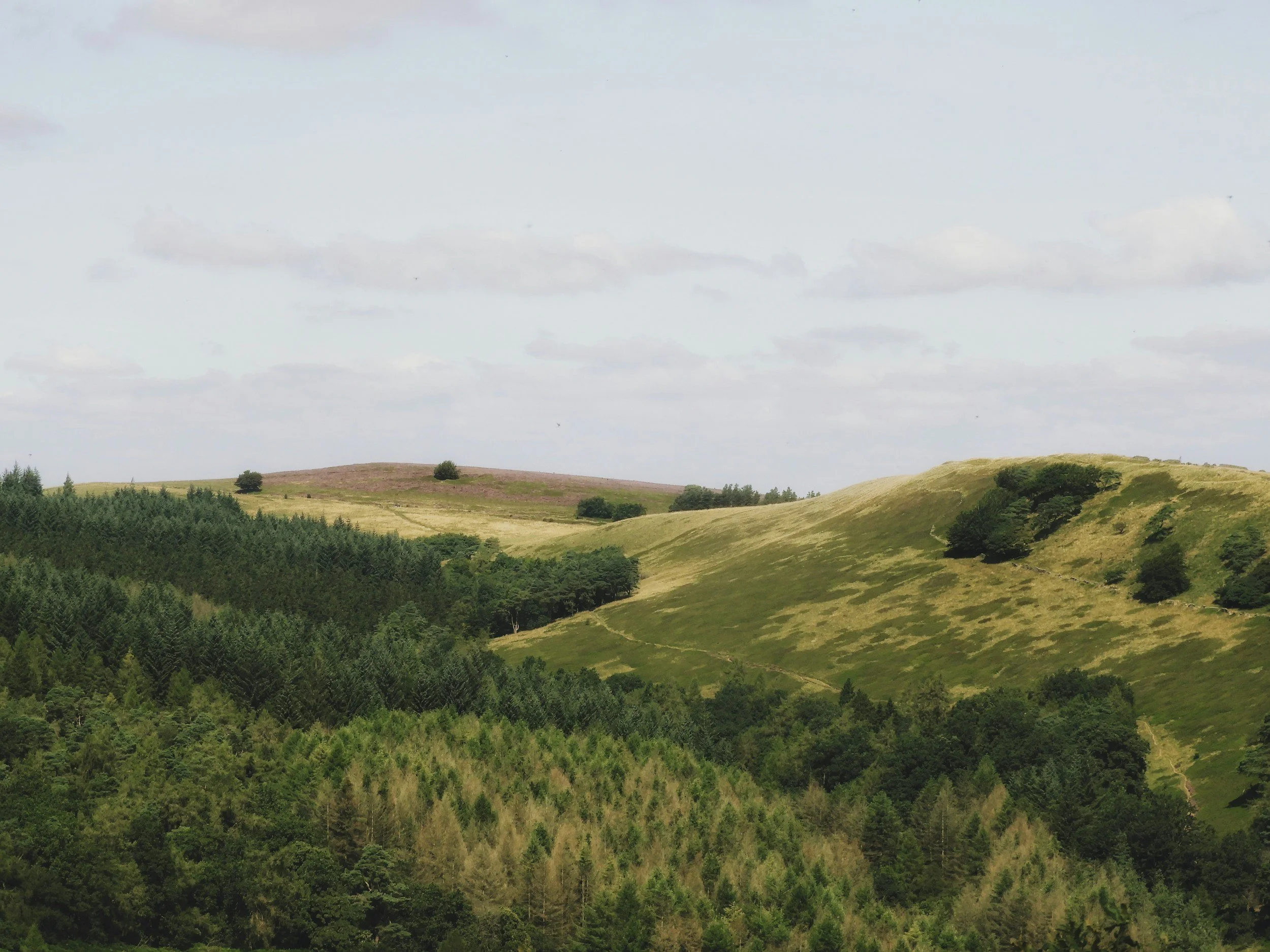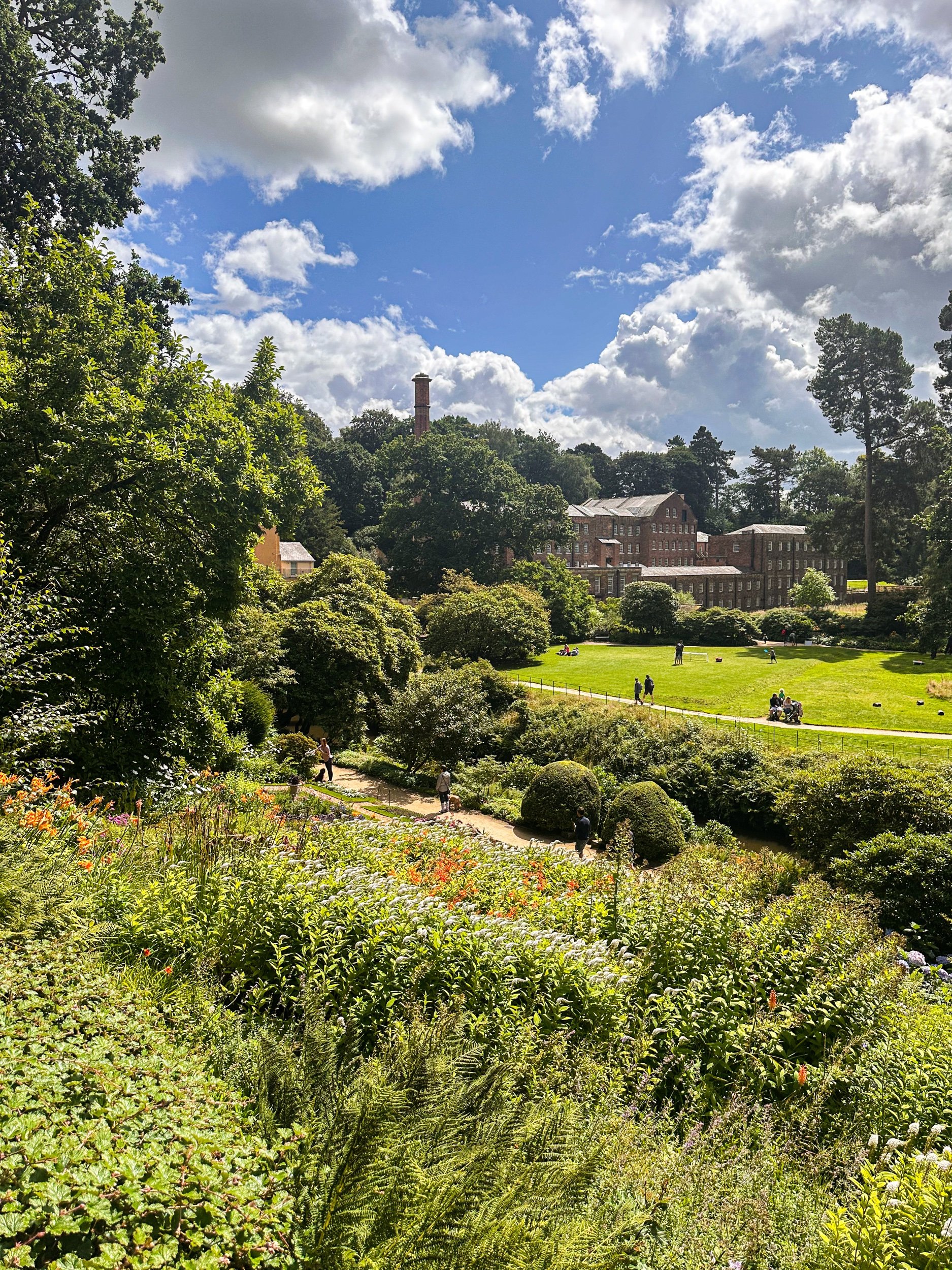ALL TRAILS
A walk through Brontë country: The Brontë Way
Wander through the landscapes that inspired a Brontë classic on this popular moorland walk
Start: Haworth Main Street, near the Brontë Parsonage Museum
Distance: 7.5 miles
Elevation: 825 feet
Duration: 2.5-3 hours
Difficulty: Easy (suitable for most walkers)
Navigation: Follow step-by-step on komoot or download GPX file
About the route
This relaxed walk through the Haworth moorlands makes for an ideal day out, ending with beautiful views and historic locations tied to Brontë history.
The route takes you along The Brontë Way, a route rich with Brontë history and scenery that makes you feel like you’ve stepped straight inside the sisters’ novels. The Brontë Way is a 69km (43 mile) long distance footpath which starts at Oakwell Hall ("Fieldhead" in Charlotte Bronte's novel "Shirley") near Birstall in Kirklees near Bradford, and ends at Gawthorpe Hall in Padiham near Burnley in Lancashire's Pendle Witch Country.
This particular walk takes you along a short section of The Way, winding your way past many places of interest to Bronte enthusiasts, including Penistone Hill country park, perched on the moors high above Haworth, the trail to the Bronte Waterfall and on over the Bronte Bridge up to Top Withens (a favourite walk of the Brontes themselves - with Top Withens being suggested as the contentious location for the eponymous Earnshaw house in Wuthering Heights), and of course, the village of Haworth itself.
Route difficulty
Walk type: Easy circular walk with limited elevation gain. Good for most walkers with, includes some uneven paths
Terrain: Mix of paved lanes, gravel paths, grassy trails, and some uneven moorland sections.
Inclines: Mostly gentle, with a short climb up to Top Withens that can be a little steep and exposed.
Surfaces: Some rocky patches and muddy stretches, especially after rain.
Navigation: Well-marked in most places, map/GPX needed for moorland section
Mobility: Not suitable for pushchairs or wheelchairs. This route contains stiles, steps, and narrow gates.
Why you’ll love this walk
A mix of moorland, waterfalls, ruins & literary lore
Great views at Top Withens + waterfall
Quiet in parts (especially the moors), lively in others (Haworth village)
Ideal for a Sunday stroll: nature + tearooms + pubs
Highlights:
Route highlights
Haworth
Your walk begins and ends in the charming Pennine village of Haworth, nestled in the heart of West Yorkshire’s Brontë Country. This historic village is famous as the home of the Brontë sisters (Charlotte, Emily, and Anne) and is filled with cobbled streets, quaint shops, and atmospheric tea rooms that take you back to the Victorian era. In the village centre, you’ll find the Brontë Parsonage Museum, where the sisters lived and wrote their novels, along with several charming cafes and boutiques perfect for exploring before or after your walk.
Don’t miss a visit to the Cabinet of Curiosities for a peek into local Victorian artefacts or the iconic Black Bull pub, often frequented by Branwell Brontë.
Bronte Waterfall
The Bronte Waterfall is a great place to rest on your way to Top Withens (Wuthering Heights), Alcomden Stones or Ponden Kirk (The Fairy Cave). Top Withens (also known as Top Withins) is a ruined farmhouse near which is said to have been the inspiration for the location of the Earnshaw family house in Wuthering Heights.
Just a short distance from Top Withens, the waterfall cascades down the rocks and has long attracted visitors drawn by its natural beauty and literary ties. Charlotte Brontë is said to have found solace here, and it remains a serene spot midway through the walk.
Cabinet of Curiosities
Back in Haworth, step into the Cabinet of Curiosities, a quirky shop filled with Victorian oddities, witchy trinkets, and handmade soaps that I can never seem to leave the village without. This museum-like shop truly is like stepping foot in an old apothecary store, warmly lit by glass globes, fragranced with exotic oils, and packed from floor to ceiling with rich mahogany and glass display cases. Over the years the family-run business has taken on a true labour of love, salvaging many of the shops fittings from chemists, grocery shops and museums to replicate the ‘wonder-rooms’ of a time gone by.
Wuthering Heights Pub
End your walk at the Wuthering Heights pub (close to Top Withens), a cosy spot to enjoy a pint or a hot meal after a day on the moors. This traditional Yorkshire pub has true rustic charm, with a hearty menu and an atmosphere that perfectly complements a moody moorland adventure.
Options to extend the route
For a longer hike, consider adding a detour to nearby Ponden Kirk, a rocky outcrop believed to be the inspiration for Wuthering Heights’ Penistone Crags. This can turn the walk into a full day’s outing, with more moorland views and an optional scrambling segment.
Where is Haworth?
Haworth is in West Yorkshire, England, part of “Brontë Country.” Near Keighley, within reach of Leeds and Bradford. Rural & beautiful, with moors all around.
The picturesque village is renowned worldwide as the home of the Brontë sisters, the celebrated authors of Wuthering Heights, Jane Eyre, and The Tenant of Wildfell Hall. Situated near the larger town of Keighley and easily accessible from Leeds, Haworth is part of the scenic region known as Brontë Country, an area of natural beauty that inspired much of the sisters' work.
The village itself is home to many quaint tea rooms, souvenir shops and a few quirky pitstops you can’t afford to miss. My absolute favourite is The Cabinet of Curiosities, a traditional shop that’s been restored it to its former glory as a Victorian apothecary shop.
Getting to the starting point
Arriving by car
There is limited parking along Main Street in Haworth, with additional spaces near the Brontë Parsonage Museum and pay-and-display lots available for a small fee.
Arriving by public transport
The Keighley Bus Company operates regular services to Haworth from Keighley, making it accessible by public transport from nearby towns and cities.
From Leeds
Train to Keighley (~30 mins)
Catch the Brontë Bus (B1, B2 or B3) to Haworth
From Bradford
Train or bus to Keighley
Catch transfer to the Brontë Bus to Haworth
From Hebden Bridge
Take the Brontë Bus B3 direct to Haworth (via Oxenhope)
From Keighley Station
Key transport hub with trains from Leeds, Bradford & Skipton
Then either the Brontë Bus or the KWVR heritage train to Haworth
Heritage train option
Take the Keighley & Worth Valley Railway (KWVR) steam/diesel service from Keighley direct to Haworth. It runs on weekends and daily in summer — a slower, scenic ride through the Worth Valley. Check the KWVR website for current timetables.
Travel tips:
Bus services are regular but check timetables before visiting, especially Sundays & holidays
Allow time to transfer between Keighley train & bus stations if needed
Heritage train is a great option but not daily — pre-check schedule
Parking is limited in Haworth during busy times, arrive early or use park & ride if available
✔️ Good to knows
Difficulty: This walk has gentle climbs and is suitable for all abilities.
Accessibility: This is a carrier only route. There are some steep steps and rocky paths, particularly around the waterfall itself, which aren’t suitable for pushchairs or wheelchairs. This route includes stiles.
Navigation: The walk to the falls is well signposted, but bring GPX/map for the moorland section.
Food and drink: Plenty of pubs, tearooms and shops available in Haworth at the start and end of the walk, including the café at the Brontë Parsonage Museum.
Parking: Public parking is available near Haworth’s Main Street; charges vary.
🧭 Following the route
I use komoot and OS Maps for offline navigation. To follow this walk step-by-step on komoot, simply click this link here or download the GPX file and upload it to your chosen app, such as OS Maps.
A Peak District Winter Walk: A traffic-free trail through Derbyshire's industrial past
This 8-mile circular starts at Cromford Station, looping along canal towpaths, railway trails and quarry edges (with lots of cafe stops along the way)
Start: Cromford Station, Derbyshire Dales
Distance: 8.92 miles
Elevation: 1,225 feet
Duration: 4 hours
Difficulty: Easy (with some steep sections)
Navigation: Follow step-by-step on komoot or download GPX file
About the route
This circular walk sets off from Cromford Station and takes you on a loop through one of the most historically rich corners of the Peak District. You'll pass the world-famous Cromford Mill, stroll beside a peaceful canal to High Peak Junction, climb the old railway incline to meet the High Peak Trail, detour up to a trig point, then loop around Black Rocks, the National Stone Centre, and Stoney Wood's glowing StarDisc before heading back to Cromford.
Expect a blend of stunning scenery, industrial relics and panoramic Peak District views, all without straying too far from a good brew or a pub stop.
Route difficulty
This is a mostly easy-going walk with a couple of short, steep sections — namely the Sheep Pasture Incline and the climb to Bolehill trig. Most of the route follows well-surfaced paths, including the flat canal towpath and the former railway line. There aren’t any technical sections on this walk: the paths are easy to follow. Some sections are suitable for prams, but the trig point and Black Rocks should be avoided if you're wheeling it.
Walk type: Circular
Start/finish: Cromford Station, DE4 3QJ
Terrain: Canal towpath, old railway trail, woodland, moorland edge
Difficulty: Easy–moderate with short steep sections
Good for: Heritage lovers, car-free adventures, varied scenery
Facilities: Toilets, cafes, pubs, bookshops at Cromford Mill and High Peak Junction
Route highlights
Cromford Mill
The world's first successful water-powered cotton mill, built in 1771 by Sir Richard Arkwright. Now home to cafes, bookshops, heritage tours and at Christmas — fairy lights and festive trees.
Cromford Canal
Flat, tranquil and stunning in the colder months. Look out for the Leawood Pump House and other historic canal architecture as you wander toward High Peak Junction.
High Peak Junction
Where canal meets railway — once a key interchange in Derbyshire’s industrial heyday. Pop into the heritage visitor hut if it’s open.
Sheep Pasture Incline
A short, sharp climb that once hauled goods up to the High Peak Railway. These days it hauls your legs up to great views.
Molehill Trig (unofficial name)
A brief detour off the main trail, this trig point rewards you with moorland views across Matlock.
Black Rocks
Dramatic gritstone outcrops popular with climbers. Scramble up for wide views over Cromford and Matlock Bath.
National Stone Centre
Pause to learn about the geology under your boots — or just enjoy the weirdly satisfying rock formations and sculpture trail.
StarDisc, Stoney Wood
Set within a reclaimed quarry above Wirksworth, the StarDisc is a 12-metre granite star chart representing the Northern Hemisphere night sky. It’s surrounded by 12 stone seats — one for each month — and serves as both a public artwork and celestial amphitheatre.
Middle Peak Quarry
A reminder of the area's quarrying past and present — part of the landscape’s working history.
Where is Cromford?
Cromford sits on the edge of the Peak District in Derbyshire’s Derwent Valley. It’s part of a UNESCO World Heritage Site thanks to its role in the Industrial Revolution and is well-connected by train, making it a brilliant base for car-free walks.
Things to do nearby
Visit Cromford Mill and take a guided heritage tour
Browse Scarthin Books — a legendary indie bookshop just over the canal
Ride the Heights of Abraham cable car in nearby Matlock Bath
Explore Lea Wood or Cromford Meadows for bonus easy loops
Pop into the pub or café after your walk — several options in Cromford village
Is this walk suitable for beginners?
Yes — especially if you're comfortable walking for a few hours with a bit of uphill effort. The paths are well-marked and easy to follow, but good footwear is recommended for the steeper/muddier sections. To make it easier, stick to the canal and High Peak Trail sections and skip the Black Rocks and trig point.
Is the route dog-friendly?
Yes! Dogs are welcome on all sections, though leads may be needed around livestock and near the canal. There's fresh water access along the way and plenty of good stick-carrying territory.
When is the best time to do this walk?
Spring to autumn is ideal for wildflowers, dry trails and longer days. The autumn colours in the valley are stunning, while winter brings a festive atmosphere around Cromford Mill. Avoid after heavy rain if you want to keep your feet dry.
How to extend your adventure
Link up with the Limestone Way or Derwent Valley Heritage Way
Add on a short detour to Lea Wood Nature Reserve
Explore Matlock Bath and its arcades, riverside walks and fish and chips
Turn it into a full day with a visit to Cromford Mill museum and café
Getting to the starting point
By train: Cromford Station is on the Derwent Valley Line, with regular trains from Derby and Matlock.
By car: Limited parking near Cromford Wharf or on-street in the village. Arrive early on weekends.
✔️ Good to knows
Wear sturdy boots — it’s not technical but there are steep bits
Dogs welcome, but leads needed around livestock
Toilets and food stops at Cromford Mill, High Peak Junction + National Stone Centre
Suitable for prams if you skip the trig/quarry
OS Map: Explorer OL24 (White Peak)
🧭 Following the route
I use komoot and OS Maps for offline navigation. To follow this walk step-by-step on komoot, simply click this link here or download the GPX file and upload it to your chosen app, such as OS Maps.
Cheesden Valley: a ruined valley ramble near Manchester
A 7.5-mile circular walk through an unexpected pocket of wilderness in Greater Manchester, featuring mill ruins, chimney stacks, pubs, hidden waterfalls and a woodland tearoom just outside Rochdale
Start: Owd Betts lay-by, Edenfield Road, Greater Manchester
Distance: 7.5 miles
Elevation: 725 feet
Duration: 3 hours
Difficulty: Easy (with some slippery sections in the colder months)
Navigation: Follow step-by-step on komoot or download GPX file
About the route
This circular walk begins at the lay-by near the historic Owd Betts pub and loops through the Cheesden Valley — an area rich in industrial heritage and natural beauty. You’ll descend into a wooded gorge, follow Cheesden Brook past the ruins of old mills and weirs, spot a dramatic chimney stack rising through the trees, and pass a tucked-away waterfall before climbing out of the valley to return via moorland paths and a tea stop near Norden.
This route started off as a spontaneous wander while in the area and it turned out to be one of my all-time favourite low-level walks. I wasn’t expecting much from this one, but those walks often turn out to be the best, don’t they?
Route difficulty
This is an easy to moderate walk with a mix of woodland trails, uneven valley paths, and field edges. There’s around 800 feet of elevation, with most of the climbing as you leave the valley mid-route. The paths are generally easy to follow but can be muddy, particularly after rain. Good boots are a must. While it’s low-level in terms of elevation, this is a proper walk—not a gentle parkland stroll.
| Walk type | Circular |
|---|---|
| Distance | 7.5 miles / 12 km |
| Time | 3.5–4 hours (plus stops) |
| Start/finish | Owd Betts lay-by, Edenfield Road |
| Terrain | Valley paths, woodland trails, moorland edge tracks |
| Difficulty | Moderate, with steeper/muddy sections |
| Good for | Unexpected views, industrial history, spontaneous adventures |
| Facilities | Pub, tearoom (limited hours), roadside parking |
Route highlights
Cheesden Lumb Mill: One of many atmospheric ruins along the brook — built in 1786 and now overgrown but still impressive..
Chimney stack: A tall, photogenic relic of Cheesden’s industrial past, rising through the woods like something from a lost world.
Cheesden Brook & waterfall: Follow the water through the valley and keep an eye out for a waterfall tucked to the side of the trail.
Wildlife sightings: Keep an eye out for wild deer in the woodland near the tea garden (couldn’t believe my eyes seeing wild deer just a few miles outside of Rochdale!).
Goats and alpacas: Keep your eyes peeled near the fields and enclosures for goats and alpacas (a highlight of the walk for me!).
Moorland views: As you climb back out of the valley, views open up toward Greater Manchester and beyond.
Millcroft Tea Garden: A beautiful, old-school tea room hidden away in the woodland — only open on Sundays (12pm-6pm).
Where is Cheesden Valley?
Cheesden Valley lies between Rochdale and Edenfield, within the Greater Manchester boundary but feeling far wilder than its postcode suggests. It’s one of the best hidden-gem walks near Manchester — remote-feeling yet surprisingly accessible.
Things to do nearby
Visit Ashworth Moor Reservoir for a bonus short loop or picnic with a view.
Grab a post-walk pint at the Owd Betts pub (check opening times).
Tuck into tea and cake at Millcroft Tea Gardens (only open on Sundays, 12pm-6pm).
Explore more ruins by extending the route along other Cheesden Brook mill sites.
Is this walk suitable for beginners?
Absolutely, with some caveats. If you’re new to walking but happy to cover 7+ miles over a few hours, and don’t mind mud or mild climbs, this route is for you. The terrain isn’t difficult, but some parts can get super muddy, especially after heavy rain. Navigation is straightforward with a downloaded route.
Is the route dog-friendly?
Dogs are welcome throughout most of the route, including the trails and woodland. They must be kept on leads around livestock.
When is the best time to do this walk?
Spring/summer: Green woodland, flowing water, chance of deer sightings
Autumn: Gorgeous leaf colour and atmospheric light (save this one for autumn if you can!)
After rain: The waterfall is fuller, but the paths can be slippery
Avoid heavy downpours: It can get boggy and slow-going
How to extend your adventure
Add on Knowl Hill for extra views and more challenging elevation
Loop around Ashworth Moor Reservoir before or after the main route
Link to nearby moorland tracks if you want a longer day out
Visit the site of Deeply Vale Festival for a quirky local history detour
Getting to the starting point
By car: Park at the lay-by opposite the Owd Betts pub, Edenfield Road, OL12 7TY.
By public transport: Bus routes run from Rochdale and Bury, but you’ll likely need to walk a short way from the nearest stop.
✔️ Good to knows
Wear proper footwear the valley can get muddy, especially after rain
Millcroft Tea Gardens is only open on Sundays (12pm-6pm)
Bring a snack and water refreshment stops may be closed
Use a GPS route or Komoot navigation is mostly simple but a few turns can be missed
Dogs welcome on lead near livestock
Arrive early on weekends the lay-by is small and fills quickly
Mobile signal patchy download maps offline
Facilities: Pub at start/finish (check hours), tea room near Norden, no public toilets en route
🧭 Following the route
I use komoot and OS Maps for offline navigation. To follow this walk step-by-step on komoot, simply click this link here or download the GPX file and upload it to your chosen app, such as OS Maps.
Kilburn White Horse: A walk to the ‘finest view in England’
A circular North York Moors walk featuring iconic chalk carvings, cliff-edge gliders and a tranquil glacial lake
Start: Kilburn, North York Moors National Park
Distance: 7 miles
Elevation: 925 feet
Duration: 3 hours
Difficulty: Easy-moderate (with some steep sections)
Navigation: Follow step-by-step on komoot or download GPX file
About the route
This 7-mile loop explores the dramatic southern edge of the North York Moors, starting in the charming village of Kilburn. The route climbs steadily through Forestry England woodland to reach the Kilburn White Horse—a vast chalk figure etched into the hillside. From here, follow the escarpment path, where gliders from the nearby Yorkshire Gliding Club often drift silently overhead.
Midway, you can pause at Sutton Bank Visitor Centre, home to a popular tearoom and what James Herriot once called "the finest view in England." The route then descends to the peaceful shores of Gormire Lake, before winding back through woodland and farmland towards Kilburn.
Route difficulty
This is a moderate walk with a mix of woodland trails, escarpment paths and field edges. The climbs up to the White Horse and down to Gormire Lake can be steep and occasionally muddy, particularly after rain. Some sections follow the Cleveland Way and are well-signposted, but having a GPX route helps for the woodland return.
| Walk type | Circular |
| Distance | 7 miles / 11 km |
| Time | 2.5–3 hours (plus stops) |
| Start/finish | Kilburn village or nearby forest car park |
| Terrain | Forest trails, ridge paths, field edges, lake paths |
| Difficulty | Moderate, with some steeper and uneven sections |
| Good for | Big views, hidden lakes, plane spotting, woodland wanders |
| Facilities | Café, loos and visitor centre at Sutton Bank |
Route highlights
Kilburn White Horse
England’s most northerly chalk figure, this striking 318-foot carving dominates the hillside above Kilburn and makes for an epic early viewpoint. You can spot it from miles away—but nothing beats standing right beside it.
Yorkshire Gliding Club
Perched high above the Vale of York, this hilltop airfield adds some unexpected drama to your walk. On a good day, you’ll spot sleek gliders launching from the cliff edge and silently soaring overhead.
Sutton Bank Visitor Centre
Halfway through the walk, the National Park centre is the perfect place to pause. Grab a cup of tea or cake from The Truffled Hog, refill your water, and enjoy the famous viewpoint overlooking Hood Hill and the valley below.
Gormire Lake
Nestled beneath the cliffs of Whitestone Scar, Gormire is one of the few natural lakes in the North York Moors. Shaded by trees and alive with birdlife, it’s a peaceful spot with local legends of ghostly horses and bottomless depths.
Where is Kilburn?
Kilburn is a small village on the southern edge of the North York Moors National Park in North Yorkshire. It’s best known for the nearby Kilburn White Horse and for its connection to Robert Thompson, the famous ‘Mouseman’ furniture maker. The village sits just off the A170, around 6 miles east of Thirsk, and is a popular starting point for walks along the Cleveland Way and surrounding escarpment.
Things to do nearby
Visit the ruins of Byland Abbey
Explore the Sutton Bank bike trails or hire bikes from the centre
Pop into Kilburn village to see local woodcarver Robert Thompson's Mouseman workshop
Is this walk suitable for beginners?
Yes, with care. The route has clear paths and signage in parts, but the inclines and descents around the escarpment can be challenging for newer walkers. Take your time and wear decent footwear. The halfway café stop helps break things up nicely.
Is the route dog-friendly?
Dogs are welcome throughout most of the route, including the trails and woodland. They must be kept on leads around livestock and near the gliding club. Dogs are also welcome at The Truffled Hog (the cafe at Sutton Bank).
When is the best time to do this walk?
The views from Sutton Bank and the escarpment make this walk special, so aim for clear or partly cloudy conditions. In fog or low cloud, visibility is limited and the best viewpoints may be missed. Always check the forecast and dress accordingly.
Late spring through early autumn offers the best mix of dry trails, active gliders and clearer views. Autumn colours add extra drama in the woods, while summer brings long daylight and ideal picnic conditions. Avoid after heavy rain, as parts of the path can be muddy.
How to extend your adventure
This route links nicely with other trails around the Kilburn and Sutton Bank area. For a longer adventure:
Explore the quiet ridge above Gormire Lake for extra views
Link with the White Rose Walk, which starts at the Kilburn White Horse
Add a climb to Hood Hill, a small peak just south of the escarpment
Include a detour to Byland Abbey for a mix of walking and history
Local legends and folklore
Gormire Lake has long been the subject of folklore. One tale tells of a knight and his horse plunging into the waters from the cliff above, cursed to rise again each century. Some say the lake is bottomless, though it’s actually around 29 feet deep.
Best photo spots
Looking out over the White Horse from the top of the escarpment
Watching gliders from the Cleveland Way ridge
Reflections at the edge of Gormire Lake, especially on calm days
Getting to the starting point
By car: Kilburn is just off the A170 near Thirsk. Park on Low Town Bank Road for direct access to the White Horse climb, or in Kilburn village for a full loop.
By public transport: The nearest rail station is Thirsk. From there, local buses or a short taxi ride will get you to Kilburn.
✔️ Good to knows
Café: The Truffled Hog at Sutton Bank Visitor Centre (open daily)
Toilets: Available at the visitor centre
Dogs: Allowed on leads, though not permitted inside the gliding club café
Footwear: Sturdy boots recommended
Map: Download route in advance as signal can be patchy
Parking: Pay & display at Sutton Bank or free lay-bys near Kilburn
🧭 Following the route
I use komoot and OS Maps for offline navigation. To follow this walk step-by-step on komoot, simply click this link here or download the GPX file and upload it to your chosen app, such as OS Maps.
A Timeless Loop: Waterfalls, Woods & Wandering from Goathland Station
A wander through railway nostalgia, hidden waterfalls and moss-draped woodland in the North York Moors
Start: Goathland Station car park, North York Moors
Distance: 5 miles
Elevation: 675 feet
Duration: 2 hours
Difficulty: Easy (with care around the waterfalls)
Navigation: Follow step-by-step on komoot or download GPX file
About the route
A 5-mile circular walk through the heart of the North York Moors, starting and ending at Goathland Station. This route combines woodland wanders, moorland edges, hidden waterfalls and a quirky little pub tucked into a valley. You’ll walk sections of the old railway trail, dip into the timeless hamlet of Beck Hole, discover Thomason Foss and Mallyan Spout, and loop back through Goathland village.
Time it right and you’ll catch the sound of steam engines echoing through the trees.
Route difficulty
This is a relatively gentle walk with a few sections that require care, particularly near Thomason Foss and Mallyan Spout, where paths can be steep, muddy or uneven. A bit of scrambling is needed in places, and the rocks near the waterfalls can be very slippery, especially after rain.
Most of the route is gentle underfoot, especially along the old rail trail and woodland paths, but caution is advised near water.
Distance: 5 miles / 8 km
Time: 2.5–3 hours with faff and photo stops
Start/finish: Goathland Station car park
Terrain: Woodland trails, old rail paths, rocky sections near waterfalls
Difficulty: Moderate — easy-going in places, steep/slippy near waterfalls
Good for: Waterfall lovers, moody weather wanderers, filming location fans
Facilities: Cafés, pub, loos in Goathland village
Route highlights
Goathland Station: Better known to many as Hogsmeade Station from Harry Potter and the Philosopher’s Stone. It’s also a popular filming location for Heartbeat, the long-running 1960s police drama. Goathland stood in for the fictional village of Aidensfield, and many of the village’s shops and buildings still reference the show today.
The Inn Way & rail trail: A wide, accessible path that traces a former railway line. Perfect for easy walking and glimpses of Victorian engineering.
Beck Hole & Birch Hall Inn: A pint-sized hamlet in a steep-sided valley. The Birch Hall Inn is part pub, part sweet shop, and a worthy detour for a snack or half pint.
Thomason Foss: A lesser-known but enchanting waterfall, nestled in a quiet wooded gorge. The path is rough in parts but worth the clamber. Care is needed here as the trail becomes narrow and rocky.
Mallyan Spout: A 70-foot waterfall tucked into a dramatic gorge. Expect mossy rocks, dripping ferns and the soothing rush of water. The route down and back up is steep and can be slippery.
Where is Goathland?
Goathland is a moorland village in the North York Moors National Park, about 9 miles southwest of Whitby. It’s surrounded by rolling heather moorland, pine forests, and old railway lines, and feels beautifully tucked away — yet is surprisingly easy to get to.
It’s best known for its vintage station, Heartbeat filming spots, and easy access to some of the area’s loveliest short walks.
Things to do nearby
Ride the North Yorkshire Moors Railway for a steam-powered view of the surrounding moorland.
Explore the moors on longer circular routes from Goathland or Grosmont.
Visit the Mallyan Spout Hotel for a post-walk cream tea.
Pop into the Goathland Tea Rooms or the Aidensfield Arms (for Heartbeat fans).
Is this walk suitable for beginners?
Yes, with caution. For anyone with impaired mobility, it’s best to skip the Thomason Foss detour and take care near Mallyan Spout. Stick to the main paths and allow time for rest stops.
When is the best time to do this walk?
This route works in any season:
Spring brings wildflowers and fast-flowing waterfalls
Summer offers leafy shade and buzzing wildlife
Autumn makes the surrounds come to life with misty moors
Winter can be magical too, though paths may be icy or boggy
Drizzly weather only adds to the old-world charm, but waterproofs are a must.
How to extend your adventure
Continue from Beck Hole towards Grosmont via the old railway incline for a longer route.
Explore Wheeldale Beck and nearby moorland paths.
Join the Lyke Wake Walk route if you’re after a much bigger day out.
Visit the nearby Hole of Horcum for another classic moorland loop.
Getting to the starting point
By car: Goathland Station has a dedicated car park (pay & display). Arrive early on weekends and holidays.
By train: Take the North Yorkshire Moors Railway steam service (seasonal) or regular train to Grosmont and walk from there (longer route).
By bus: Limited bus services run between Whitby, Pickering and Goathland. Check timetables in advance.
✔️ Good to knows
Facilities: Toilets and refreshments available at Goathland Station and some village cafés
Parking: Pay & display car park at Goathland Station
Refreshments: Birch Hall Inn, cafés in Goathland village, Mallyan Spout Hotel
Dog-friendly? Yes, but leads needed near livestock and steep sections
Accessibility: Not suitable for pushchairs or wheelchairs — uneven, narrow and steep paths
Mobile signal: Patchy — download offline maps
Waterfall warning: Paths near Mallyan Spout and Thomason Foss are steep and slippery — take care after rain
Best for: Mixed weather, film fans, nostalgia lovers
🧭 Following the route
I use komoot and OS Maps for offline navigation. To follow this walk step-by-step on komoot, simply click this link here or download the GPX file and upload it to your chosen app, such as OS Maps.
A walk through Brontë country: Brontë Waterfall and Top Withens
Wander through the landscapes that inspired a Brontë classic on this popular moorland walk
Start: Haworth Main Street, near the Brontë Parsonage Museum
Distance: 5 miles
Elevation: 400 feet
Duration: 2 hours
Difficulty: Easy (suitable for most walkers)
Navigation: Follow step-by-step on komoot or download GPX file
About the route
This relaxed walk through the Haworth moorlands makes for an ideal day out, ending with beautiful views and historic locations tied to Brontë history. The walk from Haworth leads you across scenic moorlands, rich with Brontë history and captivating scenery. The route takes you through open countryside with a dose of literary lore, including Top Withens (thought to be the inspiration behind Heathcliff’s home in Wuthering Heights) and the striking Brontë Waterfall.
Route difficulty
Walk type: Easy circular walk with limited elevation gain. Good for most walkers with, includes some uneven paths
Terrain: Mix of paved lanes, gravel paths, grassy trails, and some uneven moorland sections.
Inclines: Mostly gentle, with a short climb up to Top Withens that can be a little steep and exposed.
Surfaces: Some rocky patches and muddy stretches, especially after rain.
Navigation: Well-marked in most places, map/GPX needed for moorland section
Mobility: Not suitable for pushchairs or wheelchairs. This route contains stiles, steps, and narrow gates.
Why you’ll love this walk
A mix of moorland, waterfalls, ruins & literary lore
Great views at Top Withens + waterfall
Quiet in parts (especially the moors), lively in others (Haworth village)
Ideal for a Sunday stroll: nature + tearooms + pubs 🍵🍺
Walk highlights:
Route highlights
Haworth
Your walk begins and ends in the charming Pennine village of Haworth, nestled in the heart of West Yorkshire’s Brontë Country. This historic village is famous as the home of the Brontë sisters (Charlotte, Emily, and Anne) and is filled with cobbled streets, quaint shops, and atmospheric tea rooms that take you back to the Victorian era. In the village centre, you’ll find the Brontë Parsonage Museum, where the sisters lived and wrote their novels, along with several charming cafes and boutiques perfect for exploring before or after your walk.
Don’t miss a visit to the Cabinet of Curiosities for a peek into local Victorian artefacts or the iconic Black Bull pub, often frequented by Branwell Brontë.
Bronte Waterfall
The Bronte Waterfall is a great place to rest on your way to Top Withens (Wuthering Heights), Alcomden Stones or Ponden Kirk (The Fairy Cave). Top Withens (also known as Top Withins) is a ruined farmhouse near which is said to have been the inspiration for the location of the Earnshaw family house in Wuthering Heights.
Just a short distance from Top Withens, the waterfall cascades down the rocks and has long attracted visitors drawn by its natural beauty and literary ties. Charlotte Brontë is said to have found solace here, and it remains a serene spot midway through the walk.
Cabinet of Curiosities
Back in Haworth, step into the Cabinet of Curiosities, a quirky shop filled with Victorian oddities, witchy trinkets, and handmade soaps that I can never seem to leave the village without. This museum-like shop truly is like stepping foot in an old apothecary store, warmly lit by glass globes, fragranced with exotic oils, and packed from floor to ceiling with rich mahogany and glass display cases. Over the years the family-run business has taken on a true labour of love, salvaging many of the shops fittings from chemists, grocery shops and museums to replicate the ‘wonder-rooms’ of a time gone by.
Wuthering Heights Pub
End your walk at the Wuthering Heights pub (close to Top Withens), a cosy spot to enjoy a pint or a hot meal after a day on the moors. This traditional Yorkshire pub has true rustic charm, with a hearty menu and an atmosphere that perfectly complements a moody moorland adventure.
Options to extend the route
For a longer hike, consider adding a detour to nearby Ponden Kirk, a rocky outcrop believed to be the inspiration for Wuthering Heights’ Penistone Crags. This can turn the walk into a full day’s outing, with more moorland views and an optional scrambling segment.
Where is Haworth?
Haworth is in West Yorkshire, England, part of “Brontë Country.” Near Keighley, within reach of Leeds and Bradford. Rural & beautiful, with moors all around.
The picturesque village is renowned worldwide as the home of the Brontë sisters, the celebrated authors of Wuthering Heights, Jane Eyre, and The Tenant of Wildfell Hall. Situated near the larger town of Keighley and easily accessible from Leeds, Haworth is part of the scenic region known as Brontë Country, an area of natural beauty that inspired much of the sisters' work.
The village itself is home to many quaint tea rooms, souvenir shops and a few quirky pitstops you can’t afford to miss. My absolute favourite is The Cabinet of Curiosities, a traditional shop that’s been restored it to its former glory as a Victorian apothecary shop.
Getting to the starting point
Arriving by car
There is limited parking along Main Street in Haworth, with additional spaces near the Brontë Parsonage Museum and pay-and-display lots available for a small fee.
Arriving by public transport
The Keighley Bus Company operates regular services to Haworth from Keighley, making it accessible by public transport from nearby towns and cities.
From Leeds
Train to Keighley (~30 mins)
Catch the Brontë Bus (B1, B2 or B3) to Haworth
From Bradford
Train or bus to Keighley
Catch transfer to the Brontë Bus to Haworth
From Hebden Bridge
Take the Brontë Bus B3 direct to Haworth (via Oxenhope)
From Keighley Station
Key transport hub with trains from Leeds, Bradford & Skipton
Then either the Brontë Bus or the KWVR heritage train to Haworth
Heritage train option
Take the Keighley & Worth Valley Railway (KWVR) steam/diesel service from Keighley direct to Haworth. It runs on weekends and daily in summer — a slower, scenic ride through the Worth Valley. Check the KWVR website for current timetables.
Travel tips:
Bus services are regular but check timetables before visiting, especially Sundays & holidays
Allow time to transfer between Keighley train & bus stations if needed
Heritage train is a great option but not daily — pre-check schedule
Parking is limited in Haworth during busy times, arrive early or use park & ride if available
✔️ Good to knows
Difficulty: This walk has gentle climbs and is suitable for all abilities.
Accessibility: This is a carrier only route. There are some steep steps and rocky paths, particularly around the waterfall itself, which aren’t suitable for pushchairs or wheelchairs. This route includes stiles.
Navigation: The walk to the falls is well signposted, but bring GPX/map for the moorland section.
Food and drink: Plenty of pubs, tearooms and shops available in Haworth at the start and end of the walk, including the café at the Brontë Parsonage Museum.
Parking: Public parking is available near Haworth’s Main Street; charges vary.
🧭 Following the route
I use komoot and OS Maps for offline navigation. To follow this walk step-by-step on komoot, simply click this link here or download the GPX file and upload it to your chosen app, such as OS Maps.
Wessenden Valley Framing the Landscape Walk to Marsden
A stunning circular walk from the Wessenden Head “Framing the Landscape” frame down through the wild and beautiful Wessenden Valley, before finishing in the lively yet picturesque village of Marsden.
Start: Holme Moss Car Park, A6024 (above Holme village)
Distance: 7 miles
Duration: 2-3 hours
Elevation: 900 feet
Difficulty: Moderate – good paths but with some uneven, steep, and exposed sections
Navigation: Follow step-by-step on komoot, or download GPX file
About the route
This high-moor circular starts right beside the Wessenden Head “Framing the Landscape” frame, one of six open-air art installations by Yorkshire artist Ashley Jackson in partnership with the National Trust. It’s perfectly positioned to frame the view down the Wessenden Valley – a glimpse of the epic scenery ahead.
From the layby, the route follows the Pennine Way down into the valley, passing a chain of four reservoirs – Wessenden Head, Wessenden, Blakeley, and Butterley. You’ll stop at Blakeley Clough waterfall, a hidden spot perfect for a summer paddle, before continuing into Marsden.
The return leg climbs gently back onto the moors, with far-reaching views towards Holme Moss and the surrounding hills, before rejoining Wessenden Head Road.
Route difficulty
Moderate. Most of the walk is on clear tracks or reservoir paths, but there are a few steeper climbs, rocky sections, and exposed moorland. A reasonable level of fitness and good footwear are recommended
Route highlights
Wessenden Head frame: A striking start and end point.
Blakeley Reservoir & waterfall: Peaceful, hidden, and beautiful.
Marsden village: A midpoint for coffee, cake, or a pint.
Butterley Reservoir: Impressive curved spillway and waterside path..
Why you’ll love this walk
Start and end at a Framing the Landscape art installation.
Four reservoirs in one loop – each with its own character.
The Blakeley Clough waterfall – a wild swimming/dipping gem.
A mix of valley walking and high-moor views.
Things to do nearby
Standedge Tunnel Visitor Centre – canal history and boat trips.
Holmfirth – moorland market town with shops, pubs, and galleries.
Holme Moss – another nearby frame if you’re collecting them all.
Getting to the starting point
By car: Park in the layby on Wessenden Head Road (HD9 4EU). Free parking for a handful of cars.
By public transport: Bus 352 runs between Holmfirth and Marsden, stopping near the start.
Following the route
I use komoot and OS Maps for offline navigation. Follow the full route step-by-step komoot, or download GPX file and upload it to your preferred app.
Good to knows
Footwear: Waterproof boots advised – moorland and reservoir paths can be wet year-round.
Exposure: This is a high-moor route; bring layers and waterproofs.
Dogs: Allowed, but keep on leads near livestock and on moors in nesting season
Holme Moss Framing the Landscape Walk
A short and easy moorland walk from Holme Moss car park to one of the Peak District’s striking “Framing the Landscape” art installations, with sweeping Dark Peak views from the very start
Start: Holme Moss Car Park, A6024 (above Holme village)
Distance: 8 miles
Duration: 3-4 hours
Elevation: 1,125 feet
Difficulty: Moderate - moorland paths, some uneven ground, a few steady climbs
Navigation: Follow step-by-step on komoot, or download GPX file
About the route
This is a full-day moorland walk that starts high on the A6024 at Holme Moss Car Park, immediately giving you huge views across the Dark Peak.
You’ll visit the Holme Moss “Framing the Landscape” frame, one of six open-air art installations by Yorkshire artist Ashley Jackson, before heading deeper onto the moors towards Snailsden Reservoir. The loop around Snailsden is wonderfully peaceful, with big sky views, heather-clad slopes, and glimpses of Yateholme Reservoir below.
The route has a mix of well-trodden paths and more rugged moorland tracks, making it a satisfying walk without being overly strenuous..
Route difficulty
Moderate. While there are no huge climbs, the distance, exposure, and occasional boggy patches mean it’s best suited to walkers with a reasonable level of fitness and decent footwear.
Route highlights
Holme Moss frame: Perfectly positioned for panoramic Dark Peak views.
Snailsden Reservoir: A quiet, secluded spot surrounded by wild moorland.
Yateholme views: A lovely vantage point over the reservoir and surrounding hills.
High moorland atmosphere: Ever-changing skies and a real sense of space.
Why you’ll love this walk
A unique blend of art and landscape – the Holme Moss frame makes for a standout photo stop.
Varied scenery – open moors, wild reservoirs, and far-reaching valley views.
Peaceful paths – Snailsden is quieter than the better-known Peak District reservoirs.
A satisfying circular route with big skies from start to finish.
Things to do nearby
Holmfirth: Enjoy lunch, coffee, or a browse in the town’s independent shops.
Digley Reservoir: A gentler, low-level reservoir walk just down the road.
The Fleece Inn, Holme: Cosy pub meals in a classic moorland village setting.
Getting to the starting point
By car: Park at Holme Moss Car Park (A6024, above Holme village). Free parking but limited spaces – get there early on sunny weekends.
By public transport: Buses run to Holme village; from there it’s a steep walk up the A6024 (no pavement in places – take care).
Following the route
I use komoot and OS Maps for offline navigation. Follow the full route step-by-step komoot, or download GPX file and upload it to your preferred app.
Good to knows
Footwear: Waterproof walking boots are essential – moorland sections can be boggy.
Navigation: Carry a map or GPX – some moorland paths are less defined.
Exposure: This is a high, open route – expect wind, even on calm days.
Dogs: Allowed on public rights of way (footpaths and bridleways), but keep them on a lead during bird-nesting season.
Dog restriction in place (2024–2029):
Dogs not permitted on the surrounding Open Access moorland (which part of this long route passes through).
How to extend your adventure
You could link this route with other moorland tracks towards Black Hill or Wessenden Head, ticking off another of the “Framing the Landscape” frames in the process.
How to Walk to the Framing the Landscape Frames at Wessenden and Holme Moss
High on the moors above Holmfirth, you might spot something unexpected rising from the heather – giant wooden picture frames.
These aren’t random pieces of garden décor, but part of Framing the Landscape, a series of open-air art installations created by Yorkshire artist Ashley Jackson in partnership with the National Trust. The aim? To celebrate the beauty of the Peak District and Yorkshire’s moorland by literally framing the views that have inspired artists and walkers for generations.
In this guide, we’ll explore two scenic walks to the frames near the village of Holme – one taking in the Wessenden Valley and Marsden, the other leading up to the Holme Moss viewpoint. Both are easy to reach and perfect for combining art, nature, and fresh moorland air.
What is “Framing the Landscape”?
There are six frames in the series, scattered across the northern Peak District, Yorkshire, and surrounding moorland. Each one is carefully positioned to highlight a view Ashley Jackson considers particularly special – from sweeping valleys and rugged tors to reservoirs tucked away between rolling hills.
The frames themselves are sturdy timber structures, big enough to stand in, making them not only striking landmarks but also perfect photo spots. They invite you to pause, step inside, and see the landscape as a living work of art.
The six frames are located at:
Wessenden Head – overlooking the Wessenden Valley and reservoir.
Holme Moss – with panoramic views over the Dark Peak.
Hardcastle crags - stunning woodland near Hebden Bridge.
Roseberry Topping - overlooking one of Yorkshire’s most iconic hills.
Brimham Rocks - framing the dramatic gritstone formations.
Ogden Water - a peaceful reservoir setting near Halifax.
In this guide, we’re focusing on the first two – both easy to reach from the village of Holme – but you could make it a longer-term mission to visit all six.
Walk 1: Wessenden Head to Marsden via the Wessenden Frame
Best for: Moorland views, reservoirs, and ending in a lively village.
Starting from a layby on Wessenden Head Road, this route leads you past the Wessenden “Framing the Landscape” frame – perfectly capturing the valley and Wessenden Head Reservoir – before following the Pennine Way downhill towards Marsden.
Along the way, you’ll pass a string of reservoirs, enjoy vast moorland views, and wander through the dramatic Wessenden Valley. The route takes you to Marsden midway, where cafés, pubs, and bakeries await.
Following the routes
I’ve mapped out two routes for this walk, both starting from the frame. Walk one takes you to a hidden waterfall and up to West Nab trig, while walk two includes a stop off at the pretty village of Marsden for tea, cake, and pints.
Walk 2: Holme Moss Car Park to the Holme Moss Frame
Best for: A short, high-level walk with sweeping Peak District views.
Perched high on the moors just off the A6024, the Holme Moss frame offers some of the best panoramic views in the Dark Peak.
Starting from Holme Moss car park, this is an easy-moderate circular walk that still packs a big scenery punch. On a clear day, you can see for miles – and it’s especially magical at sunset when the hills turn gold.
Why You’ll Love These Walks
Unique photo opportunities – frame yourself in the Peak District.
Flexible distances – make them quick strolls or full hikes.
Year-round appeal – beautiful in sunshine, mist, or snow.
Easy access – parking right by both starting points.
When to Go
These frames are worth visiting any time of year, but for the best photos aim for early morning or golden hour in the evening. In winter, the moors can be wild – layer up and check the forecast before heading out.
Getting There
By car:
Wessenden Head layby: HD9 4EU
Holme Moss Car Park: A6024, above Holme
Both are free and have limited spaces.
By public transport: Buses run between Holmfirth, Holme, and Marsden – check local timetables for the 352 and 355 services.
Good to Knows
Footwear: Even short walks here can be boggy – boots recommended.
Weather: The moors are exposed; conditions can change quickly.
Respect the land: Stick to paths and keep dogs under control (note: dogs aren’t permitted on the West Nab section).
11 STUNNING PUB WALKS BY TRAIN NEAR MANCHESTER
No car? No problem 👇
Manchester has some of the most stunning pub walks on its doorstep, and the good news is you don’t need a car to reach them. From wild swimming at Gaddings Dam to breathtaking moorland views at The Trinnacle, these 10 incredible pub walks are all easily accessible by train.
1. Gaddings Dam Loop (England’s Tallest Beach)
Start Point: Todmorden Centre (OL14 5QA)
Train from Manchester: 20 minutes from Manchester Victoria to Todmorden Station
Nestled above Todmorden, this beautiful Gaddings Dam loop takes you to a hilltop ‘beach’. Perfect for a sunny day, this route offers wild swimming for the brave and scenic views for those who prefer to stay dry. After exploring the dam, you can extend your adventure to nearby Stoodley Pike.
The Walk Details:
Distance: 5.34 miles
Duration: 2–3 hours
Elevation: 660 feet
Route difficulty: Easy-moderate, some steep sections
Navigation: follow step-by-step here.
Post-walk pub: Head back to Todmorden and treat yourself at The Golden Lion for a well-earned meal or pint, or stop off at The Shepherd’s Rest mid-route.
2. New Mills Millennium Walkway (The Torrs Circular)
Start Point: New Mills Central Station
Train from Manchester: 20 minutes from Manchester Piccadilly
Discover the hidden gem of The Torrs, a dramatic river gorge beneath the historic town of New Mills. The highlight of this walk is the Millennium Walkway — a suspended bridge that winds along the River Goyt. With a mix of lush greenery and industrial history, this walk is short but sweet, and one of my favourite local routes.
The Walk Details:
Distance: 4 miles
Duration: 1.5 hours
Elevation: 350 feet
Route difficulty: Easy
Navigation: follow step-by-step here
Post-walk pub: After your walk, explore New Mills’ cafes and shops. Stop at Revive Cafe for a hearty lunch or pick up a treat at High Street Books & Records.
3. Hathersage and Stanage Edge
Start Point: Hathersage Station
Train from Manchester: 50 minutes from Manchester Piccadilly to Hathersage
A Peak District favourite, this circular walk starts in the idyllic village of Hathersage before gently climbing to Stanage Edge and the popular Robin Hood’s Cave.
The Walk Details:
Distance: 7 miles
Duration: 3 hours
Elevation: 1,200 feet
Difficulty: Easy (gentle climbs, mixed terrain)
Navigation: follow step-by-step here
Post-walk pub: After tackling the edge, head back to Hathersage where you’ll find pubs and cafes aplenty.
4. Macclesfield Forest & Shutlingsloe (The Cheshire Matterhorn)
Start Point: Macclesfield Station
Train from Manchester: 25 minutes from Manchester Piccadilly
Shutlingsloe, often called “The Cheshire Matterhorn,” is a sharp peak that rewards hikers with sweeping views of the surrounding countryside. The trail starts in the peaceful Macclesfield Forest, winding through tranquil woods before the exhilarating climb to the summit.
The Walk Details:
Distance: 6 miles
Duration: 2–3 hours
Elevation: 1,200 feet
Navigation: follow step-by-step here
Post-walk pub: The route descends past picturesque reservoirs, offering perfect photo opportunities. Wrap up your walk with refreshments at The Leather’s Smithy, a charming pub on the forest's edge.
5. Solomon’s Temple Walk (A Historic Folly Above Buxton)
Start Point: Buxton Pavilion Gardens (SK17 6BE)
Train from Manchester: 1 hour from Manchester Piccadilly to Buxton
This scenic walk to Solomon’s Temple starts and ends in one of the Peak District’s most-loved towns. Solomon’s Temple is a charming Victorian folly sitting atop Grin Low Hill, offering stunning views of Buxton and beyond. Along the way, explore the remnants of historic lime kilns and the surrounding woods.
The Walk Details:
Distance: 5.62 miles
Duration: 2 hours
Elevation: 625 feet
Difficulty: Easy
Navigation: follow step-by-step here
Post-walk pub: Finish your adventure with a visit to Buxton’s famous Georgian architecture or a relaxing tea at one of the town’s many cosy pubs.
6. The Trinnacle Loop (Dove Stone Reservoir)
Start Point: Greenfield Station
Train from Manchester: 35 minutes from Manchester Victoria to Greenfield
Sitting high on Saddleworth Moor, The Trinnacle stands is a unique rock formation overlooking Dove Stone Reservoir. The route offers steep climbs, cascading waterfalls, and a bit of optional scrambling if you’re wanting to add a slight challenge to the route.
The Walk Details:
Distance: 4.13 miles
Duration: Less than 2 hours
Elevation: 950 feet
Difficulty: Moderate (scrambling sections up the Clough)
Navigation: follow step-by-step here
Post-walk pub: After your walk, unwind at The Clarence Inn or explore the nearby pubs in Greenfield.
7. Prestbury Village Circular
Start Point: Prestbury Station
Train from Manchester: 30 minutes from Manchester to Prestbury
The Cheshire countryside at its best. A relaxed mix of fields, quiet lanes, and leafy woodlands with a beautiful pub finish.
The Walk Details:
Distance: 6 miles
Duration: 2 hours
Elevation: 375 feet
Difficulty: Easy
Navigation: follow step-by-step here
Post-walk pub: After your walk, unwind at The Bridge Inn or cosy up in one of the village’s many coffee shops.
8. Ramsden & Riding Wood (Via Holmfirth)
Start Point: Huddersfield Station
Train from Manchester: Train to Huddersfield or Sowerby Bridge, then 314 Holme Valley Bus Connection towards Holme
The Walk Details:
Distance: 5 miles
Duration: 2 hours
Elevation: 800 feet
Difficulty: Easy (gentle incline)
Navigation: follow step-by-step here
Post-walk pub: After your walk, unwind at The Fleece Inn.
9. Hardcastle Crags, Hebden Bridge (Heptonstall)
Start: Hebden Bridge Station
Train from Manchester: ~45 minutes
A mix of woodland trails and moorland ridge with a riverside mill café halfway round.
The Walk Details:
Distance: 8 miles
Duration: 3 hours
Elevation: 950 feet
Difficulty: Easy (gentle incline)
Navigation: follow step-by-step here
Post-walk pub: After your walk, refuel at The White Lion Inn in Heptonstall.
10. Etherow to Werneth Low
Start Point: Marple Railway Station
Train from Manchester: Train to Marple (26 mins)
This nine mile pub walk truly has it all: a cracking pub, unreal views across Manchester, and my favourite place in Stockport to sit and watch the world go by (the Keg Pool at Etherow Country Park), before winding up at The Hare and Hounds.
The Walk Details:
Distance: 9.7 miles
Duration: 4 hours
Elevation: 950 feet
Difficulty: Easy-Moderate
Navigation: follow step-by-step here
Post-walk pub: Mid-walk, refuel at The Hare and Hounds - or time with sunset for impeccable views over Manchester.
11. B29 Crash Site (Glossop)
Start Point: Glossop Station
Train from Manchester: 30 minutes from Manchester to Glossop
Remote and atmospheric – a moorland walk to a haunting WW2 crash memorial site.
The Walk Details:
Distance: 9.4 miles
Duration: 4 hours
Elevation: 1,700 feet
Difficulty: Moderate (navigation + map essential)
Navigation: follow step-by-step here
Post-walk pub: After your walk, unwind at The Queens Arms in Old Glossop, or head back to Glossop Town Centre for your pick of restaurants, cafes and pubs.
The Tolkien Trail — Walk in the ƒootsteps of J.R.R Tolkien
This trail in Lancashire takes you through the landscapes that inspired Middle-earth.
Start: Hurst Green Memorial Hall Car Park
Distance: 6.73 miles
Duration: 2-3 hours
Elevation: 475 feet
Difficulty: Easy
Navigation: Follow step-by-step on komoot, or download GPX file
About the route
A circular walk from Hurst Green Memorial Hall car park, looping past Stonyhurst College, into Over Hacking Wood, alongside the River Hodder, over Cromwell’s Bridge, and back along the Ribble bank and aqueduct. Landscapes here are rumoured to have inspired parts of The Hobbit and The Lord of the Rings.
Route difficulty
This is an easy, beginner-friendly route with no major climbs. Paths can get muddy, but it’s otherwise straightforward and well-marked — perfect for a half-day adventure.
Why is it called the Tolkien Trail?
The trail is named after J.R.R. Tolkien, author of The Lord of the Rings, who spent time at Stonyhurst College during World War II while visiting his son, John, who was training for the priesthood. During his visits, Tolkien is believed to have written parts of The Lord of the Rings, drawing inspiration from the lush Ribble Valley countryside. Local place names like Shire Lane and the River Shirebourn bear striking similarities to the Shire and other elements of Middle-earth, making this a literary and scenic journey all in one.
Why you’ll love this walk
If you’ve ever dreamed of wandering through the Shire, this trail is for you. Peaceful riverside paths, ancient woodland, Tolkien lore around every bend, and a storybook pub stop to warm up mid-way. It’s atmospheric, historical, and just the right amount of whimsical.
Route highlights
Stonyhurst College — where Tolkien stayed during WW2 while visiting his son. Looks like Hogwarts, feels like history.
Shire Lane & River Shirebourn — local names that echo The Shire.
Hacking Boat House — believed to have inspired Buckleberry Ferry.
New Lodge viewpoint — possibly the real-life view from Tom Bombadil’s house.
The Shireburn Arms — cosy pub with LOTR vibes and great food.
Millie’s Café — home-baked cakes and a huge Middle-earth map on the wall.
Over Hacking Wood descent — woodland steps leading to verdant Hodder riverside.
River Hodder, Ribble & Cromwell’s Bridge — historic packhorse bridge said to have featured in local lore.
Views of Pendle Hill from fields above the riverside section — dramatic skyline.
Getting to the starting point
By train/bus: Train to Whalley or Clitheroe, then local buses (Clitheroe–Whalley–Preston) to Hurst Green. Check bus schedules for specifics.
By car: Sat nav to BB7 9QB. Park at the Memorial Hall car park (£5 donation recommended). Limited roadside space.
How to extend your adventure
Stonyhurst College museum (booking required) to explore Tolkien-related history.
Post-walk refreshment at The Shireburn Arms, Bayley Arms, or cake at Millie’s Café.
Extend into Forest of Bowland walks like Pendle Hill or Stocks Reservoir.
Is this walk suitable for beginners?
Yes, if you're okay walking ~3 hours over fields and riverside paths. Expect some mud in wet weather and around woodland stairs. A couple of short climbs but nothing too strenuous. Some of the route is way marked, but boots and route map advised.
When’s the best time to do this walk?
Late spring – early autumn is ideal for wild garlic and bluebells in Over Hacking Wood and clear riverside views. Winter is doable but muddy; waterproof footwear essential.
Following the route
I use komoot and OS Maps for offline navigation. Follow the full route step-by-step komoot, or download GPX file and upload it to your preferred app.
Good to knows
Waymarking minimal — Rely on map/GPX.
Footwear essential — Wooded and riverside bits can get muddy.
Dog friendly: Yes, dogs on leads near livestock.
Facilities: Toilets, pubs and café only in Hurst Green.
Countryside code: Close gates, pick up litter, stay on paths.
Best public transport walks near Manchester: Solomon’s Temple
A Peak District wander with woods, pubs, temples and plenty of sweet treats – no car required
Start: Buxton Station
Distance: 9.74 miles
Duration: 4 hours
Elevation: 1,275 feet
Difficulty: Moderate
Navigation: Follow step-by-step on komoot, or download GPX file
About the route
Looking for a cracking Peak District walk that ticks off skyline views, a brewery stop, and an easy train ride home? This 9-mile Buxton loop has a bit of everything: a public transport-friendly wander that’s big on moorland magic and post-walk pub stops.
Starting and ending in Buxton town centre, this 9-mile loop weaves together some of the best walking the area has to offer. You’ll climb up to Solomon’s Temple, climb to Corbar Cross, amble across peaceful moorland paths, and finish up with a well-earned beer at Buxton Brewery’s Trackside taproom. Along the way you’ll walk through parkland, Victorian gardens, and spa-town charm — the best of the Peak District in one day.
Route difficulty
Terrain: Mostly easy-going with a couple of uphill sections (Solomon’s Temple & Corbar)
Good for: Active beginners, solo hikers, or anyone after a moorland fix without needing a car
Why you’ll love this walk
Incredible views from Solomon’s Temple
Quiet, sweeping moorland paths
Trackside beers at Buxton Brewery
A stroll through Buxton’s Pavilion & gardens
Easy to reach by train or bus
Route highlights
Solomon’s Temple – A Victorian hilltop folly with 360° views over Buxton and the White Peak.
Corbar Cross – Hidden in the trees above Buxton, this striking iron cross is steeped in local history and great for a mid-hike breather.
Grin Low Country Park – Woodland trails and limestone grassland with a hint of mystery.
Trackside Taproom – Home of Buxton Brewery and a brilliant spot to fuel up after a long day’s walk.
Pavilion Gardens – A perfect spot for a brew and nosey around the gift shop mid-walk.
Things to do nearby
Buxton Pavilion Gardens – Ideal for a post-walk chill or cake stop
Buxton Museum & Art Gallery – Small, free, and surprisingly brilliant
The Crescent & Thermal Spa – Fancy a soak in some thermal waters? You’ve earned it.
Getting to the starting point
By train: Direct services from Manchester Piccadilly (≈1 hr) – Buxton station is a 5-min walk from the route start.
By bus: Hop on the 199 Skyline from Stockport or the 58 from Macclesfield.
How to extend your adventure
Got more in the legs? You can easily tag on the Dragon’s Back ridge by continuing west from Solomon’s Temple. It adds around 4 miles and takes you up into wild limestone country.
Is this walk suitable for beginners?
If you’re happy walking for 4–5 hours and don’t mind a few hills, this route’s a yes. The trails are clear and easy to follow, but comfy boots are a must.
When’s the best time to do this walk?
Late spring to early autumn is ideal, with longer days and drier trails. That said, this one’s a year-rounder with decent weatherproofs — just expect a few muddy sections in winter.
Following the route
I use komoot and OS Maps for offline navigation. To follow the full route step-by-step on komoot, click this link here or download the GPX file and upload it to your preferred app.
Good to knows
Public toilets at Pavilion Gardens
Picnic spots aplenty near Solomon’s Temple
Dog-friendly, but keep leads handy near livestock
Best public transport walks near Manchester: Upper Goyt Valley walk
A Peak District escape with woods, pubs, boardwalks and three peaceful reservoirs – no car required
Start: Whaley Bridge Station
Distance: 9 miles
Duration: 3-4 hours
Elevation: 950 feet
Difficulty: Moderate
Navigation: Follow step-by-step on komoot, or download GPX file
About the route
Looking for a cracking day walk without a car near Manchester? This scenic loop from Whaley Bridge station weaves through woodland, past not one but three reservoirs, with sweeping valley views and a boardwalk thrown in for good measure. It’s wild in parts, peaceful in others — and it starts and ends right by a trainline, a cafe, and lots of pubs.
Route difficulty
This is a manageable day walk for regular walkers. There are some steady ups and downs, especially through the valley section, and paths can get muddy in wet spells—but there’s nothing technical.
Walk type: Moderate
Terrain: Forest tracks, reservoir paths, gravel and grass trails
Accessibility: Not suitable for wheelchairs or pushchairs
Dog-friendly: Yes, on leads near water and livestock
Why you’ll love this walk
You can hop on the train and be hiking in under an hour
Three reservoirs, a woodland start, and moorland magic
Less trodden than tourist-heavy Peak routes
Peaceful paths and plenty of space to think
Lovely looped route with café options at the end
Route highlights
Hillbridge Wood
A peaceful green canopy to kick things off — look out for bluebells in spring.
Toddbrook Reservoir & dam
Cross the dam for big views and easy boardwalk strolling.
Fernilee Reservoir
More water, fewer people. A lovely stretch for snacks and a breather.
Goyt Valley
Big skies, open views, and winding tracks through heathered hills.
Errwood Reservoir
A scenic high point of the walk, often mirror-like on calm days.
Things to do nearby
Whaley Bridge cafés & pubs
Pop into Café 16 or The Bridge Bakehouse for excellent cake and coffee.
Explore Goyt Valley ruins
Add a mini detour to the old Errwood Hall ruins if you’ve got time.
Bookshop browse in Whaley Bridge
Whaley has a couple of secondhand gems for post-walk mooching.
Getting to the starting point
By train: Take a direct train from Manchester Piccadilly to Whaley Bridge (~50 minutes). Trains run regularly, even on weekends.
By car: Not needed. But if you must, there’s free parking at the station.
Following the route
I use komoot and OS Maps for offline navigation. To follow the full route step-by-step on komoot, click this link here or download the GPX file and upload it to your preferred app.
How to extend your adventure
Continue beyond Bowderdale Head for a full Howgill traverse
Detour east to Aygill Force waterfall
Explore more of the Rawthey Valley on a return loop
Is this walk suitable for beginners?
Yes, with some stamina. It’s not overly steep, but the 9-mile length makes it better suited to walkers with a few rambles under their belt. Pace it out, bring snacks, and enjoy the varied route.
When’s the best time to do this walk?
April to October offers the best conditions - lush trees, dry trails and mellow weather. The boardwalk gets slippery in winter, and the Goyt section can be boggy after heavy rain.
Good to knows
No toilets en route — use Whaley Bridge facilities before you start
Limited mobile signal in the valley—download maps beforehand
Sturdy boots essential after rain
Finish with a café stop — The Bridge Bakehouse is just across from the station
A scenic circular walk to Cautley Spout (the highest waterfall in England)
A wild walk in Yorkshire: don’t miss this thrilling Howgills lollipop loop to England’s highest waterfall
Start: Layby near The Cross Keys Temperance Inn, Sedbergh (what3words: maybe.beaks.redouble)
Distance: 5 miles
Duration: 2-3 hours
Elevation: 1,600 feet
Difficulty: Moderate
Navigation: Follow step-by-step on komoot, or download GPX file
About the route
Tucked into the folds of the Howgill Fells, this satisfying lollipop route climbs from Sedbergh’s fringe to Bowderdale Head and loops around England’s highest above-ground waterfall: Cautley Spout. Starting from the 500-year-old Cross Keys Temperance Inn, you’ll enjoy gentle beginnings, a moderate high-fell climb, and a dramatic waterfall finale.
A path of contrasts, think pastoral lowlands, broad fells, and steep-sided valleys - this is one of the best routes to get a taste of the dramatic Howgill scenery without big scrambles or crowds.
Route difficulty
This is a moderate walk suitable for hillwalkers with a basic level of fitness. The loop section includes some steeper ground, exposed felltops, and one boggy stretch above the waterfall.
Walk type: Moderate
Terrain: Pasture, fell paths, rocky sections near waterfall, occasional bog
Accessibility: Not suitable for wheelchairs or pushchairs
Dog-friendly: Yes, on leads (sheep country!)
Why you’ll love this walk
England’s highest waterfall (200m tiered cascade)
Start and finish at a stunning heritage tearoom
Sweeping views from Bowderdale Head
Varied terrain: meadows, fells, ravines
Route highlights
The Cross Keys Temperance Inn Begin with tea and homemade cake at this historic National Trust inn. It’s one of the oldest temperance inns in England — no alcohol, just charm and good food.
Bowderdale Head Reach the high point of the route with views across the Howgill Fells. Wild, expansive, and surprisingly quiet.
Cautley Spout The showstopper: a dramatic, multi-step waterfall plunging nearly 200m into the valley below. Best viewed after rain, and photo-perfect with long exposure.
Things to do nearby
Sedbergh: England’s official Book Town — indie bookshops galore
Farfield Mill: Heritage craft centre with art and textile exhibits
River Rawthey: Ideal for a post-walk paddle or picnic
Getting to the starting point
By car: From Sedbergh, take the road north toward Cautley. Just past The Cross Keys Temperance Inn, you’ll find a small lay-by for parking (limited spaces, arrive early).
By public transport: Catch a train to Oxenholme, then take a Western Dales Bus (S1T, S1W, S5 or S6 depending on the day) to Sedbergh. On select days (Tues, Thurs, Fri), you can continue on the S5/S6 to the Cross Keys lay-by.
OS Grid Ref: SD 698 969 What3words: (what3words: maybe.beaks.redouble)
Following the route
I use komoot and OS Maps for offline navigation. To follow the full route step-by-step on komoot, click this link here or download the GPX file and upload it to your preferred app.
How to extend your adventure
Continue beyond Bowderdale Head for a full Howgill traverse
Detour east to Aygill Force waterfall
Explore more of the Rawthey Valley on a return loop
Is this walk suitable for beginners?
This is a good step-up for walkers used to lower-level rambles. There are some steep sections, but no scrambling. If you’re building confidence with fell walks, this one ticks all the right boxes.
When’s the best time to do this walk?
Late spring to early autumn (April to September) is ideal. May and June give lush greenery and good waterfall flow. Winter can be icy and boggy.
Good to knows
No toilets at the start (use the pub before or after)
Mobile signal fades on the fells — download offline maps
Waterproof boots essential after rain
Limited parking, especially at weekends
Paths are not always waymarked — GPX or Komoot recommended
Giddy Edge Circular Walk, Matlock — walks by train
Could you brave Giddy Edge? Dubbed the ‘scariest footpath in England’, this circular walk in the Peak District has a mix of everything
Start: Matlock Town Centre (Matlock Station)
Distance: 4.5 miles
Duration: 2 hours
Elevation: 1,000 feet
Difficulty: Moderate
Navigation: Follow step-by-step on komoot, or download GPX file
About the route
This circular walk starts right in the heart of Matlock and climbs up through woodland trails to the lofty limestone crags of High Tor – one of the most dramatic viewpoints in the Peak District. From there, you’ll tiptoe (or stride confidently!) along the infamous Giddy Edge, a narrow clifftop path with jaw-dropping drops and cracking views over the Derwent Valley.
Once you’ve conquered the edge, the route loops gently downhill, winding through leafy paths and finishing with a relaxed wander back into Matlock town – perfect for a post-walk cuppa or pint.
It’s a brilliant half-day adventure that shows off Matlock’s wild side without straying far from creature comforts.
Route difficulty
Moderate – a short but varied 4-miler with a decent bit of uphill. The path up to High Tor is steep and can be slippery after rain, and Giddy Edge has a narrow, exposed stretch that’s not ideal for anyone with vertigo. You’ll need a basic level of fitness and a head for heights, but it’s otherwise beginner friendly. This route isn’t suitable for buggies or wheelchairs, and dogs will need to be on the lead – especially along Giddy Edge.
👣 Distance: 4 miles
⏱️ Time: 2–2.5 hours
📈 Elevation: ~230m gain
🗺️ Terrain: woodland trails, rocky paths, town pavements
⚠️ Tricky bits: steep climb, exposed edge, potentially slippy when wet
Not suitable for: Young children, pushchairs, dogs that pull on the lead (especially on Giddy Edge!)
Route highlights
Giddy Edge — ‘The scariest footpath in England’
This precipitous pathway, with its wrought iron handrail and dizzying heights, was created by the Victorians as a tourist attraction. Giddy Edge, perched in the High Tor Gardens above Matlock Bath, is widely recognised as one of the most ‘dangerous footpaths in the world’. With a 300-foot drop beside it, only the trickier sections are protected by the wrought iron handrails with nothing standing between you and the edge.
Do you need a head for heights to tackle this one?
This trail isn’t nearly as scary as it looks, in my humble opinion. Plus, the views across Matlock Dale are truly stunning, and well worth the effort for those who brave it. There is, however, an exposed drop on the cliff edge, so do take care if you’re bringing little ones.
Matlock Bath
Matlock Bath is dubbed a seaside resort 100 miles from the sea. The picturesque town is packed with chip shops, amusement arcades, ice cream parlours, and candy floss on every corner — everything you’d expect from a proper seaside town. It’s located amongst a beautiful limestone gorge on the River Derwent, and is home to stunning riverside gardens and steep wooded hillsides.
History
Matlock Bath has been a popular tourist attraction since the late 17th century, when the healing properties of its warm spa waters were first discovered. Access to the area was improved in the 18th century, and by the 19th century, Matlock Bath was a place for society’s finest to visit. Lord Byron even dubbed the town ‘Little Switzerland’ on account of its magnificent views and steep, wooded hillsides.
Heights of Abraham
This historic 60-acre hilltop estate features cavern tours, exhibitions, adventure playgrounds and much more, plus regular special events throughout the season. A ticket to the Heights includes:
Cable car journey — Enjoy a return journey on Matlock Bath’s famous cable cars, soaring high above the Derwent Valley.
Great Masson Cavern — This cavern is often dubbed one of the true wonders of Derbyshire. Take a guided tour through an illuminated cavern and discover the secrets of Masson Hill.
Great Rutland Cavern — Join the tour’s Victorian Cavern guides to learn about the history of the miners and showmen that once worked in this underground world.
Getting to Matlock
By car
Reaching Matlock is most convenient by car from most major cities, but it’s also well connected by train. We parked in Matlock town centre (not Matlock Bath), where you’ll find multiple car parks.
By train
Getting to Matlock by train is straightforward, with direct services from several cities and easy connections from others.
Getting to Matlock by Train
From Manchester
While there are no direct trains from Manchester to Matlock, the journey is straightforward with one change:
Route: Manchester Piccadilly → Sheffield → Matlock
Duration: Around 2 hours, depending on connections
Frequency: Around 32 trains per day
For planning and booking, visit The Trainline.
Direct from Nottingham and Derby
There are direct trains from Nottingham and Derby to Matlock. For schedules and booking, visit East Midlands Railway.
Good to knows
Giddy Edge: The climb up to High Tor gardens is steep and somewhat physically demanding. Giddy Edge is unfenced and not recommended for small children.
Toilets: You’ll find toilets dotted around Matlock and Matlock Bath. The toilets in Matlock Bath are 20p entry.
Food and drink: Along the route, you’ll find plenty of pubs, cafes, and fish and chip shops. We stopped off at The Midland on the return end of the walk.
Parking: We parked at the car park on Imperial Road (DE4 3NL), which cost £6 for the full day. You’ll find multiple car parks in both Matlock and Matlock bath, and you can start the route from either of these locations.
The Eamont and Wordsworth Way: The ultimate car-free adventure in the Lake District
A multi-modal, point-to-point route from Penrith to Grasmere, blending riverside paths, lake cruises, and fell walks.
Start: Penrith Station
Distance: ~13 miles walking (22 miles covered, including the lake cruise)
Elevation: 1,975 feet
Duration: 5-8 hours
Difficulty: Moderate (with some changeable conditions)
Navigation: Follow step-by-step on komoot, or download GPX file
About the route
This adventure combines the Eamont Way and Wordsworth Way, with a scenic mid-point cruise on the Ullswater Steamer. Starting at Penrith Station, you'll follow riverside paths to Pooley Bridge, sail across Ullswater, and hike over Grisedale Tarn to Grasmere. It's a journey through rivers, lakes, and fells—all in one, point-to-point route.
I took the train from Manchester, but Penrith is also easily reached from London, Edinburgh, Preston, and Liverpool.
Quick stats
Distance: ~13 miles
Duration: 6–8 hours
Elevation gain: ~2,000 ft
Terrain: Mixed—riverside paths, gravel, fell tracks
Dog-friendly: Yes (with some rules)
Public transport: Direct trains to Penrith; buses from Grasmere via Keswick
Route difficulty
The Eamont Way is flat and beginner-friendly, while the Wordsworth Way involves a steady climb to Grisedale Tarn, with uneven sections and changeable weather.
Walk type: Easy to moderate
Terrain: Tarmac, grassy tracks, rocky paths
Accessibility: Not suitable for wheelchairs or pushchairs
Dog-friendly: Yes—leads required on farmland and during travel
Is this walk suitable for beginners?
Yes, if you’re reasonably fit. The Eamont Way is beginner-friendly, and the Wordsworth Way offers a moderate challenge.
Why you’ll love this walk
✅ A riverside start, a midway lake cruise, and a fell finish—all in one day
✅ Panoramic views from Grisedale Tarn (if the weather’s on your side)
✅ Poetic connections to Wordsworth and Grasmere's famous gingerbread (I always take bag loads home with me!)
✅ Dog-friendly travel options on boat and bus
✅ Easy public transport access
Route highlights
🚶 Penrith to Pooley Bridge (~6 miles)
Start at Penrith Station and follow the Eamont Way through meadows and past Brougham Castle, tracing the River Eamont. Enjoy the quiet before arriving in Pooley Bridge, a perfect stop with cafés and pubs.
⛴️ Pooley Bridge to Glenridding (Ullswater Steamer)
Cruise past Hallin Fell and Place Fell. Enjoy lake views, spot red squirrels, and relax mid-adventure.
Fare: £16.00 (adult one-way), £10.50 (child), £1.00 (dog)
Family ticket (2 adults + 2 children): £69.75
🥾 Glenridding to Grasmere (~8 miles)
Follow the Wordsworth Way, climbing gently through Grisedale Valley. Highlights include Helvellyn’s slopes, Grisedale Tarn, and the charming village of Grasmere with its literary history.
🐾 Dog-friendly travel tips
🛳️ Ullswater Steamer
Dogs are welcome for £1.00.
Must be kept on a short lead.
Not allowed on saloon seats or upper decks.
Water bowls available at pier houses.
🚌 Stagecoach 555 Bus
Dogs allowed at driver’s discretion, must be on a lead and well-behaved.
Guide and assistance dogs always welcome.
Things to do nearby / Options to extend the route
🏛️ Dove Cottage & Wordsworth Museum
🏔️ Helvellyn or St Sunday Crag for a bigger challenge
🚣♂️ Ullswater activities like kayaking or paddleboarding
🛍️ Keswick for shopping and lakeside cafés
Where to stay
If you’re making a weekend of it (and honestly, why wouldn’t you?), we stayed at The George Hotel in Penrith. It’s a stone’s throw from the station—literally a five-minute walk, which makes rolling out of bed and onto the Eamont Way trail almost too easy.
I stayed here the night after the walk, and it was a dream. Comfy beds, a bath, a hearty breakfast included (you’ll need the carbs for this one), and a touch of historic charm without being fussy.
If you’re coming from further afield, I recommend central as a good base to get a good night’s sleep before tackling the walk. No faffing with early trains or car parks, just a relaxed start to your adventure.
When’s the best time to go?
📅 May to October for longer days and better weather. Avoid peak summer weekends for quieter paths + lake cruises.
Getting to the starting point
The route starts in Penrith, and is well-connected by:
🚂 Direct trains from Manchester (~1h 40m), London (~3h), Edinburgh (~1h 30m), Preston (~50m), Liverpool (~1h 45m)
🚗 Parking at Penrith (Park & Ride available)
✔️ Good to knows
👟 Footwear: Hiking boots essential
☔ Weather: Pack layers and waterproofs (even in summer)
🧃 Refreshments: Limited options once you leave Glenridding (bring snacks!)
🚌 Return: Bus 555 from Grasmere to Keswick, then connect to Penrith
🐾 Dogs: Lead required in fields, permitted on boat and bus with some restrictions
🔗 Handy links
🧭 Following the route
I use komoot and OS Maps for offline navigation. To follow the full walk step-by-step on komoot, simply click this link here or download the GPX file and upload it to your chosen app, such as OS Maps.
Cwm Prysor Viaduct: an atmospheric walk in Eryri
Don’t miss this hidden gem walk tucked away in the Snowdonia mountains
Start: Lay-by on the A4212, near Llyn Tryweryn (what3words: stack.crouching.scramble)
Distance: 1 mile (to the viaduct and back) or 9 miles out and back to the layby near Trawsfynydd (extended route)
Elevation: 850 feet
Duration: 1-4 hours (depending on your chosen route)
Difficulty: Easy
Navigation: Follow step-by-step on komoot, or download GPX file
About the route
Not far from the A4212 in Eryri (Snowdonia), Cwm Prysor Viaduct spans a lush valley with all the drama of a Highlands rail bridge — and none of the crowds. Built in the 1880s, this nine-arch structure once carried trains between Bala and Blaenau Ffestiniog. Today, it’s part of a scenic walk along a disused railway line where nature has reclaimed the trackbed, giving the trail a wonderfully wild, secluded feel.
If you’ve ever caught a fleeting glimpse of a dramatic rail bridge from the A4212 between Capel Celyn and Trawsfynydd, you’ve probably spotted Cwm Prysor Viaduct — a graceful relic of Victorian engineering. The old Bala and Festiniog Railway once ran through here, and though the trains are long gone, nature has quietly reclaimed the trackbed, turning this into one of Snowdonia’s most atmospheric hidden walks.
You can make this a quick detour or a full linear adventure along the disused line, soaking up views, viaducts, and moody hillsides along the way.
Distance: 1 mile (to the viaduct and back)
Extended route: ~8.8 miles (out-and-back to road near Trawsfynydd)
Time: 1–4 hours depending on route
Start/End Point: Lay-by on A4212 near Llyn Tryweryn
OS Grid Ref: SH 81438 36262
What3words: stack.crouching.scramble
Dog friendly: Yes 🐾
Public transport: None direct — nearest stop is Trawsfynydd
Route difficulty
The trail is relatively flat and easy to follow, but the mud can be a real limiter. Even in dry spells, the railway trackbed holds water like a sponge — so bring sturdy footwear and consider turning back after the viaduct if it’s been raining heavily. That said, the terrain itself is straightforward, and there’s little elevation gain.
Walk type: Easy to Moderate — mostly flat and steady, with no real incline but very boggy in places.
Terrain: Disused railway path, forestry track, and deeply puddled muddy ruts.
Accessibility: Not suitable for wheelchairs or pushchairs — path is uneven and frequently waterlogged.
Dog-friendly: Yes — dogs are welcome on leads, but be aware of sheep along the route and limited visibility in spots.
Why you’ll love this walk
Rarely visited viaduct with huge views
A “path in the sky” reclaimed by nature
Tadpoles, newts, sheep, and solitude
Extendable into a much longer railway hike
Route highlights
From the lay-by to the viaduct
Park in the lay-by just west of Llyn Tryweryn, then hop over the ladder stile to join a forestry road. At the first fork, go left — this is the start of the disused railway. You’ll follow two muddy tyre tracks through a landscape slowly being reclaimed by nature. Tadpoles squirm in puddles, the old cuttings guide your way, and before long, you’ll catch a glimpse of the viaduct.
Cwm Prysor Viaduct
Spanning 450ft across the valley and rising 120ft above the ground, the viaduct is a stunning reminder of the area’s industrial past. Its nine arches feel almost Roman in scale, and the deck (a grass path now) is open for walking thanks to a permissive access agreement. There are spots just before the bridge to view the arches — take care, as the terrain can be uneven.
Beyond the viaduct (optional)
If the conditions are dry and your boots are up for it, continue on. The route hugs the hillside and passes through weathered woodlands and pasture, with panoramic views toward Arenig Mawr. Eventually, the trail meets a single-track road near Trawsfynydd — around 4.4 miles from the start point (one way).
Things to do nearby
Llyn Celyn: Scenic reservoir with a controversial backstory
Arenig Mawr: A quieter Snowdonia summit
Trawsfynydd Lake: Ideal for picnics or extending your walk
Bala: A solid base with cafes and mountain shops
Getting to the starting point
The start is a small lay-by on the A4212. From Capel Celyn, drive west past Llyn Tryweryn and watch for the pull-in on your right. From Trawsfynydd, climb the hill — the lay-by is near the crest. The entrance is a little hidden but marked by a gate and stile.
✔️ Good to knows
This is a permissive path, not a formal right of way
Very limited parking
No signage — use OS Maps or a GPS app
Often muddy — especially beyond the viaduct
Keep dogs under control (lots of sheep)
Public transport won’t get you close
🧭 Following the route
I use komoot and OS Maps for offline navigation. To follow the full walk step-by-step on komoot, simply click this link here or download the GPX file and upload it to your chosen app, such as OS Maps.
Woodland walk with a view: Moel Famau circular
A scenic 2-hour loop in North Wales with peaceful forest trails and wide-open views from the summit
Start: Moel Famau Lower Car Park (CH7 5SH)
Distance: 4.26
Elevation: 850 feet
Duration: >2 hours
Difficulty: Easy-moderate
Navigation: Follow step-by-step on komoot, or download GPX file
About the route
Looking for a short but satisfying walk with forest calm and a big view at the top? This circular route up Moel Famau — the highest hill in the Clwydian Range — is ideal for a half-day outing. Starting from the lower car park, the route gently climbs through a mix of conifer woodland and open hillside before reaching the Jubilee Tower at the summit.
You’ll get cracking views over the Vale of Clwyd and Snowdonia on a clear day, and because it’s a relatively short route, it’s doable even if you’ve only got a couple of hours to spare.
Ideal for: beginner hikers, families, solo walkers, or anyone who just fancies a bit of elevation without a full day commitment.
Route difficulty
Walk type: Easy to Moderate — the incline is steady, with well-maintained paths all the way.
Terrain: Gravel trails, woodland paths, and grassy slopes near the top.
Accessibility: Not suitable for wheelchairs or pushchairs due to the gradient.
Dog-friendly: Yes — dogs are welcome on leads, though be aware of sheep on the upper slopes.
Why you’ll love this walk
🌲 Woodland calm – The initial forest section is quiet, shady, and peaceful — perfect for those who like a bit of forest bathing.
🏔 Big views, low effort – It doesn’t take long to feel like you’re on top of the world. The summit view is surprisingly expansive for such a short walk.
🏰 Historic summit – The Jubilee Tower ruins at the top are a unique feature — originally built to commemorate the Golden Jubilee of George III.
🐾 Great for dogs – Plenty of variety, sniffy woodland, and wide-open space to explore (just keep leads handy around livestock).
📸 Photo spots – The summit is very photogenic, especially with light catching the hills and heather in late afternoon.
Route highlights
Moel Famau Forest Trails
The lower slopes of the walk are tucked into the Moel Famau Country Park, with a network of woodland trails that weave through tall pines. It’s peaceful, well-signed, and great for warming up before the ascent.
Jubilee Tower
The partially ruined tower at the summit is a popular viewpoint — built in 1810 to mark George III’s 50-year reign, but never finished due to lack of funds. Now it’s a scenic perch with panoramic views over North Wales and even out to Liverpool Bay on a clear day.
Panoramic ridge views
From the summit, you’ll get sweeping views of the Clwydian Range, the Dee Estuary, and the peaks of Snowdonia in the distance. It’s especially pretty at golden hour when the hills take on a purpley-gold hue.
Things to do nearby
Loggerheads Country Park – Just a 10-minute drive away, this riverside park offers more woodland walks, limestone cliffs, and a visitor centre with café and loos.
Ruthin – A charming market town with a castle, independent shops, and plenty of places to grab lunch or a coffee post-walk.
Llangollen – Around 30 minutes away, this pretty town on the River Dee makes a great add-on for the day with canal walks, a steam railway, and good pub grub.
Getting to the starting point
By Car
Set your sat nav to Moel Famau Lower Car Park (CH7 5SH). Parking fees apply. The roads up are narrow in places, so take it slow on the final stretch.
By Public Transport
Public transport options are limited. The closest rail stations are Mold and Ruthin, but you’d need a taxi or bike to reach the start point from there.
✔️ Good to knows
Footwear: Walking boots or grippy trainers — the path is mostly solid, but can get slick after rain.
Facilities: Toilets at the car park. Closest cafe facilities can be found at Loggerheads or Mold.
Best time to go: Early mornings or late afternoon for quieter paths and beautiful light.
Map: Moel Famau is part of the Clwydian Range AONB — worth grabbing an OS Explorer 265 if you want to explore more of the area.
🧭 Following the route
I use komoot and OS Maps for offline navigation. To follow the full walk step-by-step on komoot, simply click this link here or download the GPX file and upload it to your chosen app, such as OS Maps.
One of the best woodland walks near Manchester: A scenic loop from Pym Chair
Towering trees, panoramic views, and hidden ruins — this 6-mile Peak District walk has it all.
Start: Pym Chair Car park
Distance: 6 miles
Elevation: 975 feet
Duration: >3 hours
Difficulty: Moderate
Navigation: Follow step-by-step on komoot, or download GPX file
About the route
Sometimes you just need a long walk in the forest.
This circular walk from Pym Chair, nestled in the Goyt Valley, is one of the best hidden woodland walks near Manchester. It combines everything that’s great about walking in the Peak District: peaceful woodland trails, wide-open ridge walks, quiet historical landmarks, and some of the best sunset views in the area.
Starting at Pym Chair car park, the route takes you through dense forest and past the haunting ruins of Errwood Hall, then climbs gently up to St Joseph’s Shrine, and further still to the scenic ridge line of Shining Tor and Cats Tor. On a clear evening, these ridges are the perfect spot for a sunset.
💡 Planning more walks like this? Search Forestry England to find your nearest forest trails and hidden gems.
Route difficulty
Walk type: Moderate — manageable for most, but includes some inclines and uneven ground.
Terrain: Woodland trails, gravel paths, and open moorland ridges. Expect a few muddy patches after rain.
Accessibility: Not suitable for wheelchairs or buggies due to uneven terrain and steps near the ruins.
Dog-friendly: Yes, on leads. Keep an eye out for sheep and ground-nesting birds.
Why you’ll love this walk
🌲 Forest therapy: Walk beneath towering trees and along winding paths that feel far away from the city.
🌄 Sunset-worthy views: Shining Tor and Cats Tor offer panoramic views across Cheshire, the Peak District, and beyond — perfect for golden hour.
🏛 Mysterious ruins: Discover the atmospheric remains of Errwood Hall, a Victorian estate now slowly being reclaimed by nature.
⛪️ Hidden shrine: Tucked into a hillside, St Joseph’s Shrine offers a surprising and spiritual pause, rich with local history.
🐾 Dog-friendly: Well-behaved dogs are welcome on leads, especially around livestock. There’s plenty for them to sniff and explore.
Best woodland walk near Manchester?
If you're based in Manchester or the surrounding area, this walk is a brilliant half-day escape. It’s less than an hour’s drive, but you’ll feel like you’ve stepped into another world.
This loop through the Goyt Valley has a bit of everything: forest calm, hidden history, hilltop drama, and just the right level of challenge. Whether you’re a weekend wanderer or a seasoned hiker looking for a quieter trail — this one’s worth adding to your list.
Route highlights
Pym Chair
A remote-feeling spot with a Forestry England car park (and yes, it’s free). It's the perfect base for exploring this quieter corner of the Peak District. The name comes from a rocky outcrop nearby that resembles a chair, once used as a boundary marker centuries ago. Today, it’s a quiet spot with stunning views west toward Windgather Rocks and east over moorland. It’s also a prime starting point for multiple ridge walks, especially popular with photographers chasing late-afternoon light.
The car park is managed by Forestry England and is often quieter than other hotspots like Mam Tor or Kinder — making it a brilliant base if you want a less-crowded adventure.
Errwood Hall Ruins
These atmospheric ruins are all that remain of a once-grand country house. Built in the mid-1800s, Errwood Hall was once the luxurious home of the Grimshawe family, wealthy industrialists from Manchester. Though now only the stone foundations and arches remain, you can still walk through the footprint of the grand house, imagining the turrets and sweeping staircases that once stood here.
The ruins sit tucked away in the forest, with moss-covered walls and ivy climbing over crumbled windows — it feels a bit like stepping into a forgotten fairytale. In spring, you’ll often find the area dotted with bluebells and rhododendrons, planted by the Grimshawes themselves. It’s a peaceful spot to take a break, explore, and soak up the slightly haunting atmosphere.
St Joseph’s Shrine
Built by the Grimshawe family of Errwood Hall, this small shrine still attracts visitors and walkers. You’ll often find candles, flowers, or quiet reflections left behind. Just a short walk uphill from Errwood Hall, this small, stone-built shelter is tucked into the hillside. It was built by the Grimshawe family in memory of Miss Dolores de Ybarguen, a Spanish companion and teacher who lived with them. The shrine became a site of pilgrimage and quiet reflection and is still looked after today by local volunteers.
Inside, you’ll usually find candles, flowers, rosary beads, and notes left by visitors. Whether you're religious or not, it’s a touching and tranquil spot that adds a surprising layer of history to the walk. And if you’re into your photography, the view from just outside the shrine is especially photogenic, especially in soft morning light.
Shining Tor & Cats Tor
As the highest point in Cheshire at 559 metres, Shining Tor earns its place on any Peak District must-walk list. The path to the summit is steady rather than steep, and once you reach the top, you’ll be rewarded with wide-open views over the Cheshire Plain, Macclesfield Forest, and even out towards Snowdonia on a clear day.
From here, the trail continues along the ridge to Cats Tor — slightly lower in height, but arguably even better for sunsets. The ridgeline is exposed, with big skies and golden grasses that catch the light beautifully in the evening. It’s a great place to linger, grab a snack, and let the world slow down for a bit.
Getting to the starting point
By Car
Pym Chair Car Park is your best bet (postcode area: SK23 7RF). It’s run by Forestry England and is usually free. The drive up is narrow and scenic — go slow and enjoy the views.
By train/taxi
Public transport is limited here, but you can take a train to Whaley Bridge or Buxton, then hop in a taxi to Pym Chair.
✔️ Good to knows
Footwear: Waterproof hiking boots recommended — especially after rain.
Facilities: No toilets or cafés at Pym Chair — come prepared.
Nearby food: Head to Whaley Bridge, Buxton, or Fernilee after your walk for pubs, bakeries, and coffee spots.
🧭 Following the route
I use komoot and OS Maps for offline navigation. To follow the full walk step-by-step on komoot, simply click this link here or download the GPX file and upload it to your chosen app, such as OS Maps.
12 incredible Peak District sunset walks (less than an hour from Manchester)
If you live in Manchester and you're craving a quick escape into nature after work, you don’t need to travel far. The Peak District National Park is right on your doorstep, and it’s packed with stunning spots that come alive at sunset. From dramatic ridges to quiet hilltops, you don’t need to walk for miles for big views and golden skies.
Whether you're looking for an easy evening stroll or a proper post-office adventure, these 12 spots are less than an hour’s drive from Manchester (with one irresistible bonus spot), and offer some of the best sunset views in the region.
1. Chinley Churn & Cracken Edge
Right on the edge of the High Peak, this is a cracking little walk with big views and barely any crowds. The best part? You can start straight from Chinley train station, so it’s a great one to save if you fancy leaving the car at home. Head up past the old quarry and onto the ridge – you’ll get wide open views across to Kinder Scout and South Head, and on a clear evening, the sunset over Manchester is unmatched.
Good to know: It's a bit rocky underfoot, especially near the quarry, so sturdy shoes are a shout. Takes about 1.5–2 hours as a circular.
Navigation: follow the route here.
2. Cown Edge
When it comes to walks with the best sunset views across Manchester, Cown Edge is absolutely the most underrated. It’s near Rowarth, not far from Marple, and it gives you those classic Peak District ridge views without the crowds. The sunsets up here on a clear day are unmatched – you’ll get golden light spilling across the fields and moorland, and views right across the city.
Start from: Monks Road near Chisworth or Plainsteads Farm – easy parking nearby.
Navigation: follow the route here.
3. Mount Famine
Short, steep, and totally worth it. Mount Famine is a compact ridge near Hayfield that gives you fantastic views over to Kinder Scout. It’s a great option if you’ve only got a couple of hours and want to be up high for sunset without doing a massive hike. The summit catches the light beautifully as the sun dips behind the peaks.
Top tip: You can link it with nearby South Head for a slightly longer loop.
Navigation: follow the route here.
4. Shutlingsloe – The "Cheshire Matterhorn"
Nicknamed for its distinctive shape, Shutlingsloe is one of the most iconic hills in the western Peaks. Technically on the edge of the Peak District, this one’s a great one to save for a slightly longer adventure. The walk up from Macclesfield Forest is short but steep, and from the summit you get sweeping views over the countryside. It’s particularly special at sunset, when the light stretches across the ridgelines.
Parking: Trentabank Reservoir car park (Macclesfield Forest).
Navigation: Follow the route here.
5. Curbar Edge
Curbar is one of the Peak District’s classic sunset spots – and for good reason. The edge runs along a dramatic gritstone escarpment, with wide-open views across the Derwent Valley. You don’t need to hike far to get amazing scenery, which makes it ideal if you’re short on time or fancy a more relaxed evening walk. In fact, you can park right on the edge, making it a great one to save if you’re chasing daylight.
Parking: Curbar Gap car park is the most convenient – you’re on the edge in minutes.
Bonus: Combine with Froggatt or Baslow Edges for a longer wander.
Navigation: Follow a circular route here (or park straight at the edge, no walk required).
6. Winnats Pass
If you're after pure drama from your sunset wander, this is the one. The steep limestone cliffs of Winnats Pass look incredible at any time of day, but sunset takes it up a notch. You can walk up onto the ridge for brilliant views over Castleton and Mam Tor, or stay low and watch the light fade through the pass.
Extend your walk: Combine with a short climb up Mam Tor for even more sunset views.
Nice extra: Head into Castleton after for a pint or a bite to eat.
Navigation: Follow the route here.
7. Shining Tor
A gentle ridge walk that rewards you with big views. Starting from the Goyt Valley, the path climbs steadily to Shining Tor – the highest point in Cheshire. It’s a brilliant spot for sunset, with wide skies and the hills rolling away into the distance. If it’s clear, you might even see the Welsh mountains far off in the west.
Route tip: Park at Errwood Reservoir for a straightforward out-and-back route.
Good for: Less challenging hikes with big skies.
Optional: Extend to Cats Tor for a full ridge walk.
Navigation: Follow the route here.
8. Tegg’s Nose Country Park
If you’re after something easy and scenic, Tegg’s Nose is a great option. There are a few short trails to choose from, and the views over Macclesfield Forest and the reservoirs are stunning – especially in the evening light. It’s a peaceful spot that’s easy to access, with a car park and facilities nearby.
Great for: Casual sunset walks, families, solo hikes.
Facilities: Car park, toilets, café (check opening times).
Navigation: follow the route here.
9. Kinder Scout
This is a proper Peak District adventure. Kinder Scout is the highest point in the national park, and sunset from up here is something special. You can hike up from Edale or Hayfield – both routes are steep but well-trodden – and once you’re on the plateau, it feels like another world. The light over the moors as the sun goes down is always worth the effort.
Be prepared: It’s exposed and can get chilly, so pack a torch and some layers.
Tip: Leave time to descend safely – bring a torch and check the weather.
Navigation: Follow the route here.
10. Dragon’s Back (Chrome Hill & Parkhouse Hill)
This one’s a little over an hour from Manchester, but is an absolute must for your sunset bucketlist. The “Dragon’s Back” ridge near Earl Sterndale is one of the most iconic landscapes in the Peaks – think sharp ridgelines and dramatic slopes. It’s a popular sunrise spot, but it’s just as impressive at sunset, with fewer people around and incredible light across the hills.
Worth noting: Some sections are steep and involves a scramble – it’s best done in good weather and decent boots.
Navigation: Follow the route here.
11. Win Hill
Rising above Ladybower Reservoir, Win Hill is a brilliant spot for a sunset hike. You can start from Yorkshire Bridge or Hope and climb steadily through woodland before breaking out onto the summit ridge. From the top, the views are stunning – looking across the water, down the valley, and over to Kinder. It’s peaceful, spacious, and great for taking it all in.
Start from: Yorkshire Bridge Inn or Hope train station for a rewarding uphill hike.
Navigation: Follow the route here.
12. Wingather Rocks
A quiet little viewpoint near Whaley Bridge, and a popular spot with climbers. Wingather Rocks is a great option if you want something low-key but still scenic. The walk up is short, and the rocks make a great place to sit and watch the sun drop behind the hills. It’s not as well-known as other spots, which makes it perfect if you're after a bit of solitude.
Navigation: follow the route here.
Final tips for sunset walks in the Peak District:
Time it right: Check local sunset times and allow at least 30–45 minutes before for golden hour.
Safety first: Bring a headtorch, layers, and a map – even on familiar trails.
Respect nature: Stick to footpaths, leave no trace, and keep dogs under control.
UPHILL CHALLENGES:
WALKS WITH WATERFALLS:





